COMMUNION
by Jay Werkheiser and Frank Wu
Analog magazine, Jan-Feb 2022 (novella)
A story about a man, a machine and a microbe...
"Recommended" -- Karen Burnham, Locus magazine
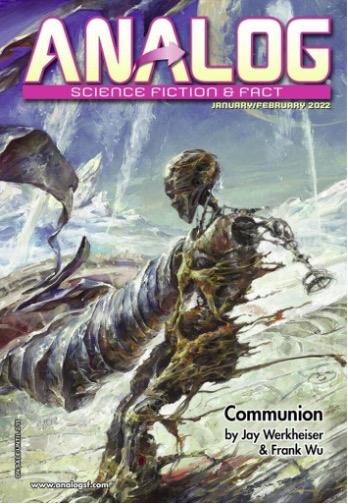
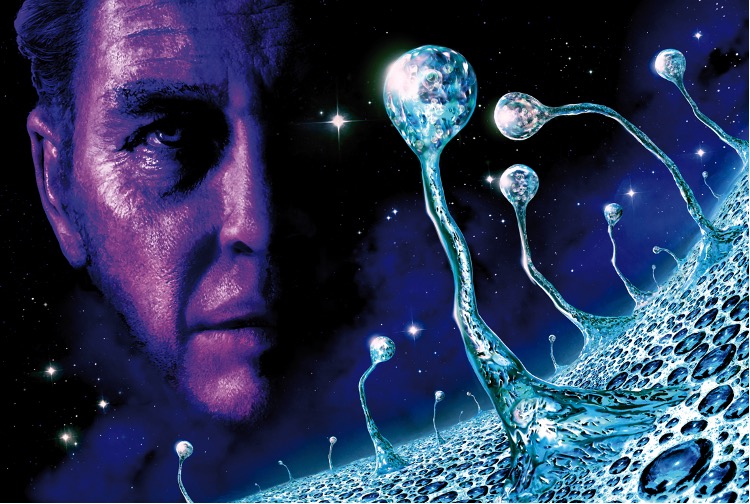
Art: Eldar Zakirov and Tomislav Tikulin
Tethered to the main cluster, I float placidly in the gentle currents.
Softly, lazily, a colony-mate bumps against me. Our membranes touch briefly then fuse.
Electricity.
Instinctively, I extend a single pseudopod to my neighbor. The texture I feel is neither wrinkled nor ridged, like the infirm or the interloper. I will need no execution proteins now.
My neighbor's shape is healthy, almost spherical, except for the single pseudopod reaching to caress mine.
Another delicious jolt. Our pseudopod tips release each other in this fleeting embrace.
Wherever we had touched, I leave tiny membrane fragments in my neighbor and my neighbor in me. The fragments carry morsels of news from afar, written in the beautiful cursive of proteins -- coiled, twisted, pleated strings of amino acids, crafted, sculpted, each protein having a unique shape, a unique purpose, a unique message.
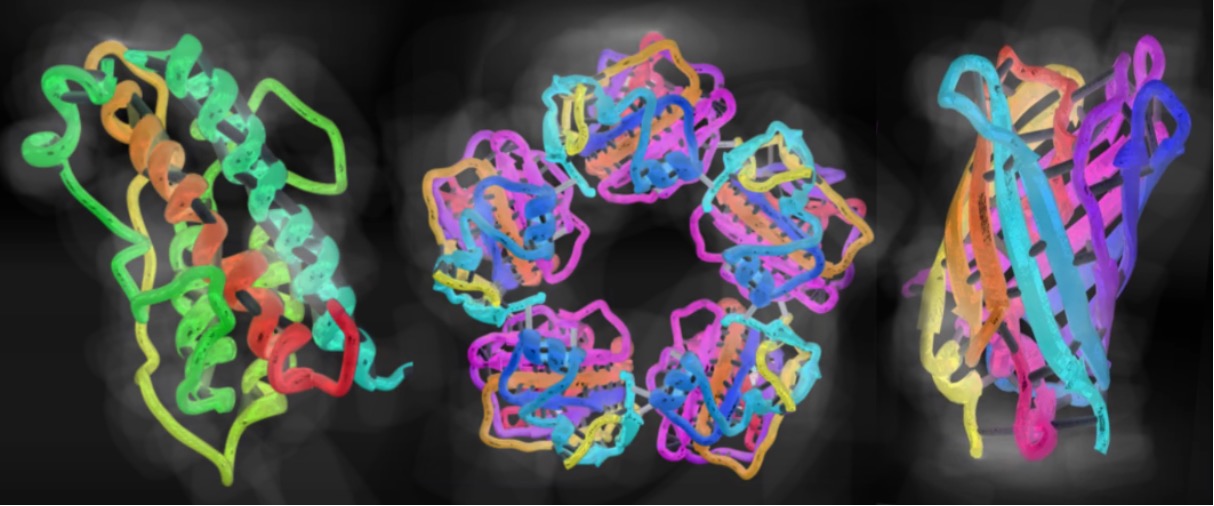
Proteins (each a convoluted string of amino acids)
The proteins bring news of a current carrying a rich amino acid vein, a high pH pocket to avoid, and colony members needing cysteine.
But one messenger protein activates alarms. Its shape is compressed, distorted by a high pressure anomaly.
I duplicate the messenger as a memory protein, flagging the original for immediate attention and transferring it down the tether.
Now I wait, ready for any command.
An unexpected response comes.
Nothing. Do nothing.
Thinkers in the main cluster tell me this is an old protein, as indicated by its degraded tail. Possibly it was passed colony to colony, from far down the magnetic field.
We are safe for now.
Thinkers tell me that the immediate concern is this: the cluster hungers.
I am to remain as I am, floating freely, luxuriating in luminous amino acids, sweeping them toward my colony-mates below.
So I do.
The flow of nutrients is optimized.
Communion. Harmony.
Nearby the nutrient pocket thrums with rare amino acids. Melodious mimosine. Harmonious hypoglycin.
Satiation, joy. We dance to the pulse of knowledge proteins.
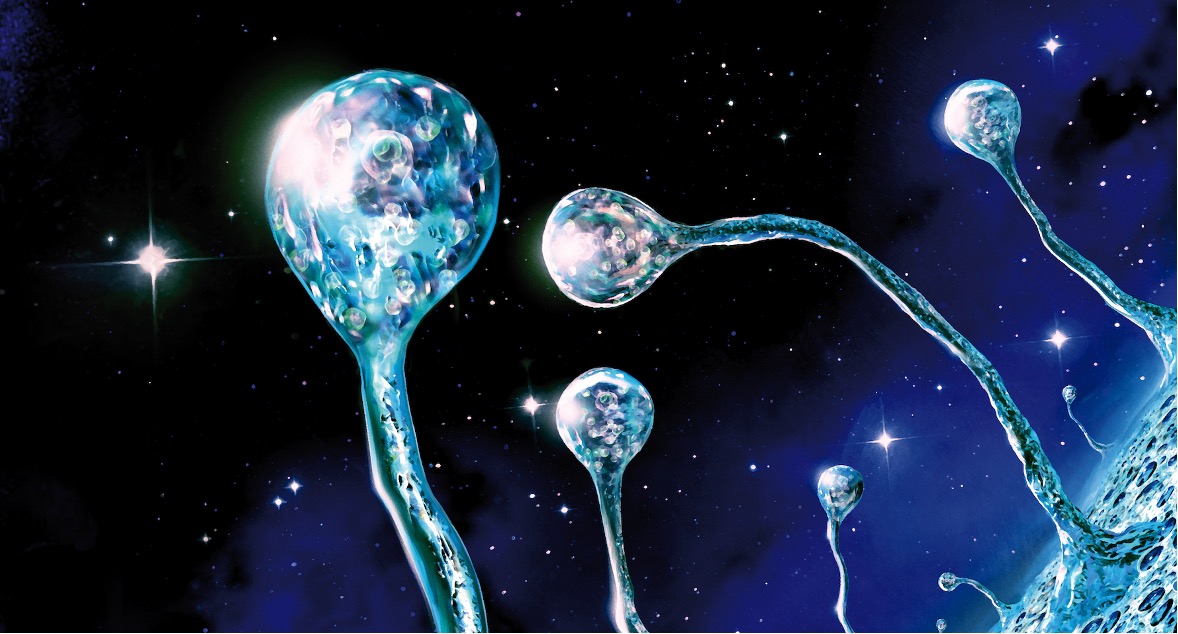
Art: Tomislav Tikulin
Suddenly, the rhythm changes.
Heat and pressure from below.
Proteins tremble, their carefully crafted shapes smashed into meaningless mounds of broken amino acids.
How could the distant pressure anomaly be so close?
Confusion. Competing commands spin off contradictory enzymes. I deactivate all but the most essential, clearing my mind.
A command protein rises up the tether, and we willingly obey. Four of my Sentinel-mates and I twist our tethers together, cross-linking them for strength.
Now we are a Sentinel group, like dozens of others extending from the colony in all directions.
No time now for feeding or frolicking. Our only job is to measure local temperature and pressure, sending reports down the tether.
Our cluster-mates will beat their ropey flagella, moving the entire colony. We will tell them where.
The pressure changes unpredictably, and I siphon fluids in and out, lest my membrane burst.
Still we monitor and report.
I remind myself that I am more than just a double-membraned bag of bio-molecules. I am a Sentinel, brave and strong.
My iron-bound proteins feel the field lines racing by.
But we hold firm.
Suddenly, I lose tension on the tether.
I send news down the cable, but receive no acknowledgment.
Is the colony destroyed?
No. We have been ripped away.
In the water, communication proteins grow diffuse. The cluster is moving away from us -- no! -- but also away from the pressure anomaly.
We have saved the colony, but not ourselves.
The currents carry us beyond the hope of return. The cable is useless now, so I release status proteins directly into the water, hoping that the retreating colony might receive my last, distant plea.
Panic proteins. My Sentinel-group-mates cling to me, as we enshroud ourselves with the tattered tether.
I extend a pseudopod and -- no! -- I feel nothing around half of my periphery. One of my Sentinel-mates is gone, and too much of me now unprotected.
We are so few, so small.
The water shears violently. Step by step my receptors lose contact as my Sentinel-mates are torn away, or shattered in the flood.
Time passes, marked by degrading alanine chains.
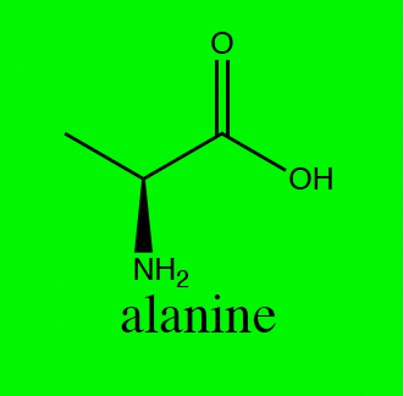
Finally, finally, the fluid around me ceases motion.
Through the alanine chain, I know how long I have traveled, but not how far.
I am safe now.
But everything is wrong. The field is too weak, as if high above home waters.
I do not belong here.
I release alarm proteins, tagged with my alanine identifier -- my name! -- but the water traps my pleas for help in a useless cloud around me.
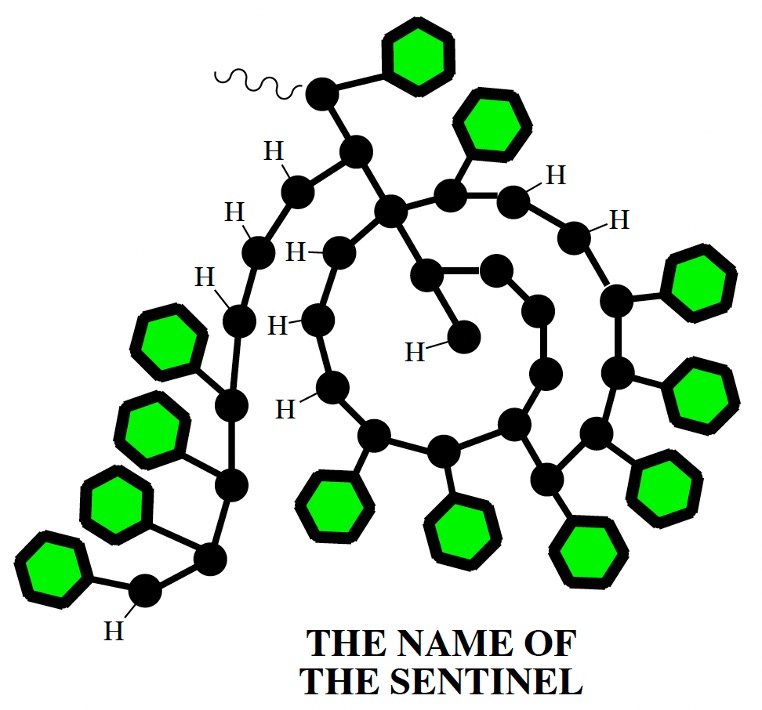
How?
Water molecules form bizarre hexagonal rings, assembling into jagged, expanding horror.
Ice crystals?
Oh no!
The deadly crystals begin forming inside me. The ice is a monster, gobbling up my proteins, crushing them, locking them in prisons of rigid water.
Thinking is difficult now.
The ice monster cannot be controlled, cannot be reasoned with, even as it eats my memories of the communion, the memories that give me strength.
Without communion, I am nothing.
Others in the colony store or remember or lead. I am made to receive signals and nutrients, re-directing them to marshal our colony's limited resources.
For what do I serve now?
Even if I find delicious streams of ethionine, I have no one to share them with.
Who now will cavort with me in coruscating amino acids? Or warn me of predatory protein swarms?
In desperation, I form a glycerol sheath to protect my precious command proteins.
The degradation cycle is slowing now. Insufficient energy to degrade alanine chains. Time has no meaning.
I am utterly alone.
Reaction ceases.
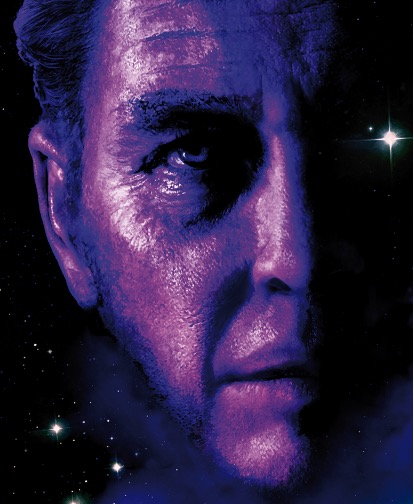
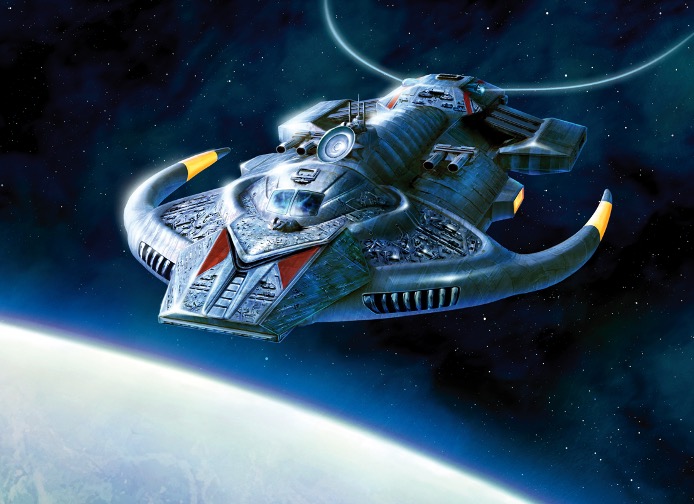
Art: Tomislav Tikulin
"Alex, do you see that icy little moon?" Nes Mason asked his robot co-pilot, as he rapped the screen with his fingertips. "We're not going to hit it, are we?"
Hidden seams opened in the back of Alex's head, splitting the hand-polished selenotanium cask. A jointed eyestalk camera telescoped out, pivoting toward Nes. Humaniform or not, that was creepy. "Recalculating trajectory now, sir."
"Recalculating?"
Nes studied the curved green line on the main screen, the slingshot path around the planet Dagda. The updated line bent closer to the ice moon, 17c.
"How did this happen?" Nes demanded. "I asked you to input all available data."
"I did, sir."
"And -- ?"
"Only one flyby probe has visited Dagda, and it constructed a model of the magnetosphere."
"So why is our trajectory off?"
"The reported data are incomplete and have low temporal resolution, sir," Alex said. "The model is therefore inaccurate. It also failed to report that the magnetic axis is not parallel to the spin axis. My magnetometers have discovered an off-center magnetic perturbation on the planet."
"Perturbation?"
"It's really quite interesting," Alex said with growing enthusiasm. "Perhaps the heavy metal core of an impacted asteroid or -- "
"That can wait, Alex," Nes said. "Now that we've slungshot around the planet, is it too late to avoid colliding with that ice moon?"
"Our orbit will intersect the surface."
Well, that was a clinical way to put it. Nes thought of another. "So we're going to crash because Keiretsu Corp. used cheap, junky hardware to map a super-dangerous navigation hazard?"
"Indeed, sir. Shall I send a letter of complaint?"
"No, but can we ramp up the current on the magsail to change course?"
"No, sir," Alex said, "The magsail cannot provide sufficient thrust."
"Hmm. This thing wasn't designed to land. Can we survive a crash?"
"I calculate a probability, sir, of 99.93% for me surviving, and 53.7% for you."
Even with all these bio-mods you put in me, Nes thought. What are the odds that I'll survive, but armless, unable to lift a gyro to my mouth?
Several fuel cells showed gray flags on Nes' console.
This was supposed to be a simple flight -- out from planet Nouvelle Terre, slingshot around Dagda, ramp up the mag field for periapsis kick, then drop the cargo at Badb Catha's L5 point. That cargo would help build a particle beam launcher, and the lonely outer planets in this system would transfigure from meteor-haunted no-man's land in eternal twilight, to county fairground, complete with festive lights, cotton candy and fancy hotels too expense for Nes to afford.
"What about using the vernier thrusters in a de-orbit burn?" Nes asked.
"My astrogation node has already taken those and everything else into account, sir."
"All right, all right, all right. How bad will the impact be?"
"That's a rather subjective question, sir. The ice moon is essentially airless, with a surface gravity around one-fifth of Nouvelle Terre's, assuming the standard accretion model and the likely rock-to-ice ratio of -- "
"Planetary geology is so fascinating just before a crash."
"No need for sarcasm, sir."
"OK, fine, fine, fine. How much damage will the ship sustain? And the particle beam parts?"
"Damage should be minimal to both the ship and the Wakefield accelerator components. Probably."

NASA: Particle Beam Accelerator
"Good, so that part of my bonus isn't in danger. Probably."
"However, the magsail is not expected to survive."
"Way to bury the lede, Alex!" Even if they could re-launch the ship from the ice moon, without the superconducting loop, they weren't going anywhere. "Retract the magloop. Now!"
"Retraction is already in progress, sir. The sail will take approximately 53 minutes longer to retract than our remaining flight time."
"But that'll be OK? If the moon has no appreciable atmosphere..."
"The problem, sir, isn't atmosphere. Even in a weak gravity field, a superconducting filament is likely to collapse, entangle and rip in several places."
Nes imagined himself trying to piece together 50 kilometers of filament, thin as masking tape, scattered across hundreds of square kilometers of broken ice. "I can't get into an EVA suit fast enough, so this is your baby, Alex!"
Alex's torso rotated to access the tool closet. As it did, Nes took a moment to admire the needlessly ornate carvings in Alex's spinal casing. Art nouveau swirls oxidized in blue and gold.
Keiretsu Corp., Nes thought with a sigh, will spring for decorations on my robot, but can't afford decent space probes or fresh tomatoes for my gyros instead of artificial processed tomato-like paste.
Then he said: "Remember, Alex, if you can't get that mag wire reeled in, we're dead. And by 'we' I mean 'me'."
In a flash, the robot had opened the interior hatch to the back of the command module, on his way to the back of the ship.
As the hatch irised shut, Nes wondered:
How long would it take for a rescue mission to get here?
Likely longer than his meager stores would last. Keiretsu would sure want to salvage the accelerator components, but they might be leisurely about it.
Once the particle beam launcher was up and running, no one would need to visit Dagda again. Imagine him, the one and only guy to ever do a periapsis kick here, all to benefit the next generation.
He remembered his old pal Escalante, who'd died of salmonellosis, when bacteria got into her water system and micrograv turned them pathogenic.
Or Umbarger, who was always scoring own-goals in low-g hockey. His mind kept seeing her fumbling with her helmet in that slow-mo docking collision. Clumsy schmuckette.
Unlike them, Nes thought, he'd probably get a nice plaque. A historical marker maybe.
After all the tears, Parvin would find that amusing.
Why is it always us poor schlubs, he wondered, hauling other people's expensive junk around the galaxy. Why is it always us that bite it?
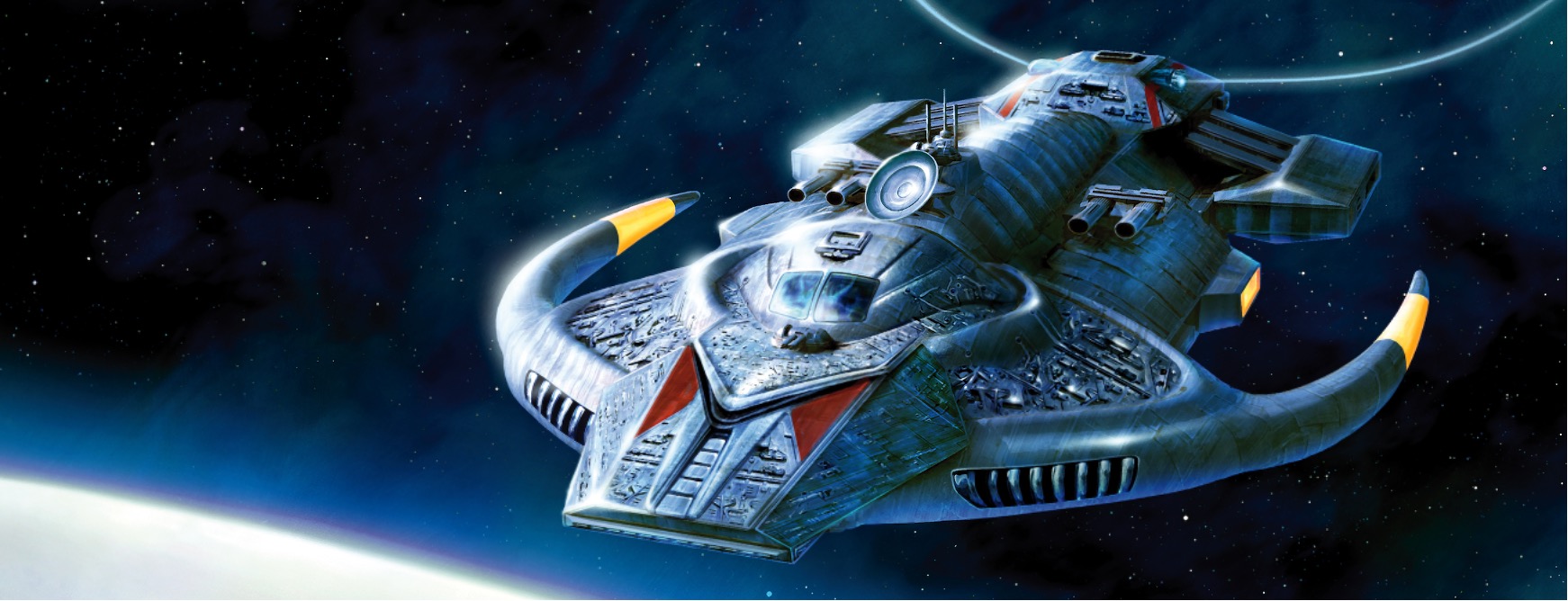
Art: Tomislav Tikulin
The ice moon was now a crisp white horizon cutting across Nes' field of view. The thing had a barely-there atmosphere of water vapor. Not much. But the heat and mechanical stress would play hell on a ship never meant to land. He radioed the robot again.
"Is the mag wire retracted?"
"Essentially yes, sir."
"Then get back here, Alex! I've got blinkling lights all over my console."
"Don't worry, sir," the robot said over the comm. "I am aware and I am resolving the most important blinklers. Also, I've laid in the most crucial inputs. If a jet or support structure fails, the others are programmed to compensate. And I apologize, but I can't leave right now, as I'm dealing with metal fatigue and thermal stress issues."
More lights turned gray and red.
Hull temp, dynamic stress, coolant pressure.
Pinched hoses, circuit faults, actuator valve failures.
A hundred things to fix, but none fixable by pressing buttons in the command module. Nes could spacewalk now, but what was the point if the ship were able to be shattered into a million pieces?
"Please tell me if I need to do anything, Alex."
"Will do, sir."
Several quiet minutes passed, with Nes ignoring the lights and taking hits from the "juice" dispenser built into the wall.
He wondered if he'd ever hold Parvin in his arms again.
Just three or four more construction jobs and cargo runs between the two of them. Then they could finally afford that apartment on Gardien Station. The one where most of the residents had a pet fennec fox, the kind with giant ears, modded to fly around in low-grav like Dumbo.
"Alex, how are we doing?"
No response.
In the middle of a crisis, but without anything specific to do, Nes idly checked on their precious cargo. Video feeds of the cargo bays showed manipulator arms bracing crates against impact.
Hold it together, baby, Nes thought, hold it together.
His mind drifted back to Parvin and he thought of her family -- her parents were both spaceship mechanics who lived, illegally, in an empty freight locker on a spacedock.
Sometimes an old cargo carrier would put in for repairs, but the owners refused to pay the bills, abandoning it in place. So the entire family would -- illegally again -- squat on the old ship for a couple months until it was sold at auction or hauled away by breakers.
Then it was back to the freight locker. He'd been there. They cleaned it best they could, but everything was hard metal, oily, sticky, the air sickening with polishing compounds and anti-corrosives. She'd never been to school a day in her life.
Nes's childhood hadn't been much better. His pilot chair was the most comfortable thing he'd ever sat in. But he'd vowed to make their lives better. Anywhere to lay roots without imminent threat of eviction or arrest would be a step up.
So he daydreamed of Parvin and flying fennec foxes and suddenly his harness smashed against his chest. There was a sharp slap to his forehead, then nothing.
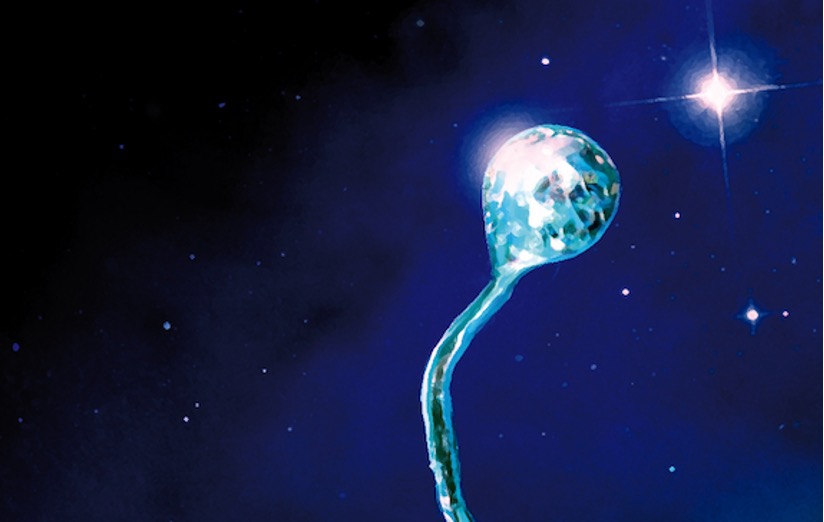
Art: Tomislav Tikulin
Hazy thoughts return.
Again molecules wiggle with warmth.
Unfrozen, many of my proteins spontaneously refold, springing back to their natural shapes. A welcome surprise.
But I am still imprisoned, still bound by icy chains to a crystal too vast to conceive.
The crystal offers me a home, a bounty of amino acids, even rare ones, all encased like me in its lattice. But it sends me no messenger proteins, shares no knowledge. It is not a colony and I can have no communion with it.
Touching the crystal is loathsome to me, and I long to escape, finding others of my kind, if any have survived.
I extend a pseudopod to push away, then another and another.
Suddenly, I am free!
But I have pushed too hard, too soon -- before completely thawed.
The ice monster is not a cluster-mate. When it releases me, it selfishly keeps fragments of my membranes, giving nothing in return.
I have ripped holes in myself.
Even though free now, still I must stop. I must expend valuable lipid stores, repairing the damage, replacing lost fluids, girding myself against osmotic trauma.
Finally, I can embark, but I have wasted so much time in my impatience.
How long before crystals engulf me anew?
Now I rotate my ropey flagella, corkscrewing through the water, seeking proteins of any kind, from someone, anyone.

Leifson, Journal of Bacteriology 62:377
Dangers dart from the deeps. Twisted tangles of weird ions. Turbulent channels, unfamiliar surfaces, grooved and pitted.
Yet for all its terrors, this world holds unexpected splendors. Molecules shimmer, somersaulting between energy states. Other molecules bob merrily in phase boundary waves. Power and beauty unlike anything in my experience. Still, I am incomplete and this world's beauty does not complete me, nor I it.
Without communion, even beauty becomes repulsive.
I will not starve here. The waters are dense with nutrients, and my receptors continue to collect them beyond the point of satiety.
Because I have no colony-mates to share this feast, the nutrients accumulate unused inside me.
This inspires my partition proteins to anchor knowledge proteins at either end of me, and protofilaments form a double-lined ring around my middle.
Oh no! Without realizing it, I am splitting, reproducing myself.
This I cannot do. Not alone.
In copying myself, in sharing the beauty inside me, I should rejoice.
I cannot.
I am a Sentinel, not of the main cluster, not a founder.
Only they have all the proteins needed to establish a new, healthy colony.
Not me.
Without the right cluster-mate to merge with, I cannot become a founder, cannot know the joy of union.
Sadly, I copy multiple proteases to degrade the middle line, to destroy my own nutrient stores.
Now is not the time to reproduce. Will such a time ever come?
I choose a direction -- does it matter which? -- and set out, searching, leaving my markers on every hideous surface.
I cannot go on, yet I go on.
Still I search.
Then, unbelievably, an alarm protein drifts toward me. A sign of another survivor?
Alas! The name on the protein is my own.
But how?
Could my markers have drifted so far from me?
I re-check the protein's identifier.
I have never been so happy to make a mistake!
The name on this marker is similar to mine, but not mine. I check it again, carefully noting where the alanine chain branches or circularizes, where it is substituted or studded with sugars.
This is surely not my name!
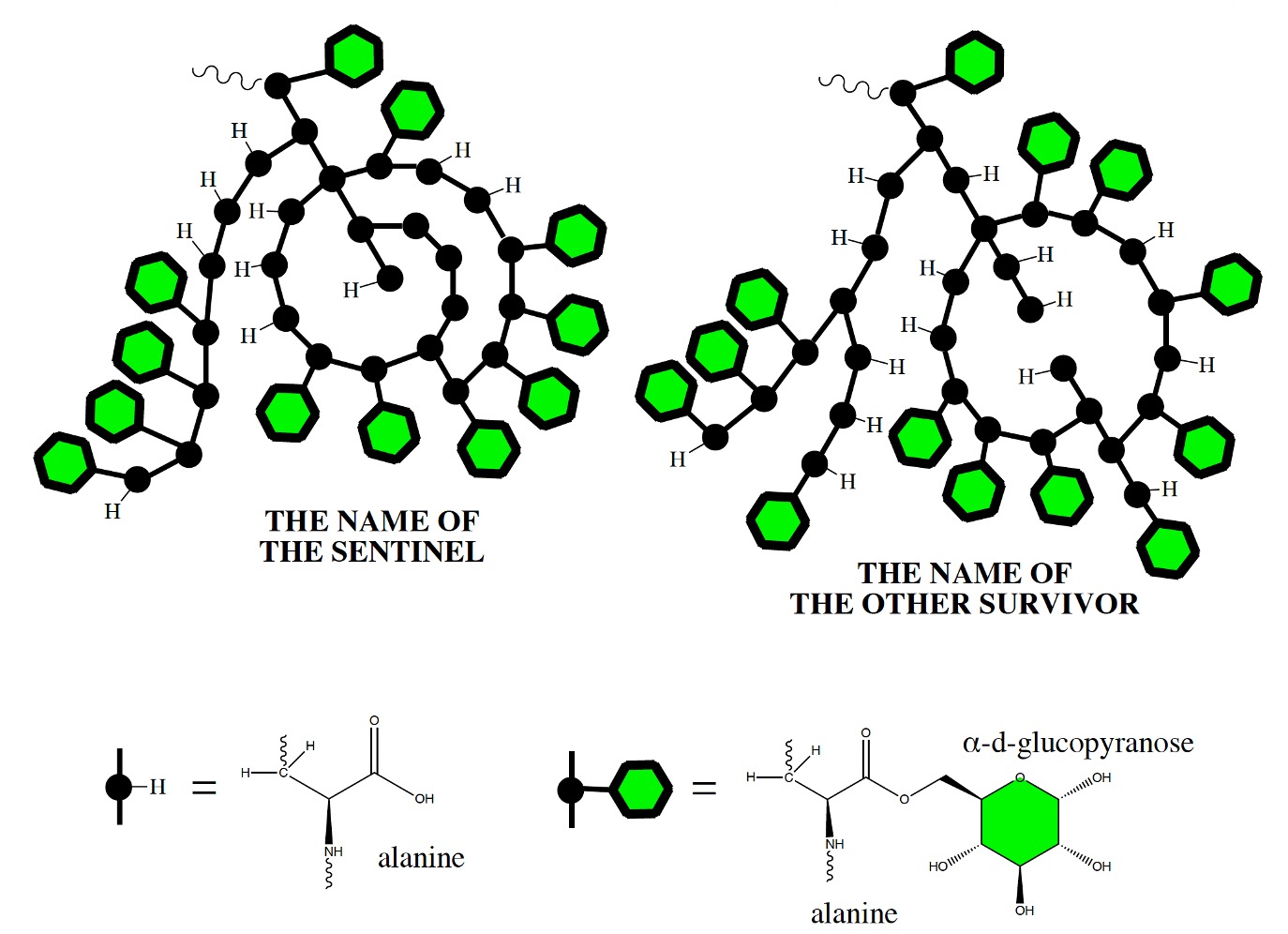
Maybe this protein is simply waste, proteinaceous detritus. Or...?
I backtrack to the exact spot where I found the marker, and I will search in all directions, until I find another of these markers, and another and another, and I will follow them up the concentration gradient, until again I have communion.
Belatedly, I realize that the warmth is fleeting.
If only I had not wasted so much time damaging and repairing myself!
Though I will freeze again soon, I am no longer afraid.
I am defiant.
Even when the ice entraps me anew, it also must have captured the other survivor, perhaps somewhere nearby.
And when the warmth returns, I will melt myself free, carefully this time, and I will --
Reactions cease.
#
Nes woke himself coughing. His head throbbed and he tasted his own blood.
Oily smoke filled the cockpit. But what was on fire? Fuel lines? A junction box? Him? Was he on fire?
The red flashes nearby were not flames, but alarm lights. They couldn't all be true alarms, could they?
At least he still had electricity.
He heard the vents bringing in the smoke. But from where in the ship? And where was the ship?
As he turned his head, pain shot from the base of his skull, down his spine, to his hip.
He tried looking through the starboard porthole, but his vision was blurry. Then he realized he was only using one eye. His left was open just a slit, the right not at all. He touched it and it felt bloody, gooey.
"Alex, how bad does my eye look?" Nes asked, turning toward the co-pilot seat.
It was empty.
He tapped his comm. "Alex, report!"
No answer. He needed that robot to survive.
"Alekseev, where are you?"
Through the porthole, through the one good eye, Alex saw nothing but ice around him. No equivalents of polar bears, no Arctic foxes, no snow bunnies. Nothing to hunt and turn into thin-shaved doner kebab meat. Just undulations of ice, caves and caverns, cliffs and frozen rivers of ice. Tumultuous oceans, the waves frozen mid-surge.
He thought he saw rising fangs of ice, dripping with drool. No. An over-active imagination was a bad combination with head trauma. But there was something liquid, spurting from the ground, turning into flakes as they tumbled back down.
He tried the comm again, this time annunciating as clearly as possible. "ALXv23, where are you?"
"Apologies, sir," Alex's voice came over the speakers. "Comms are not entirely reliable at the moment. If you are not otherwise occupied, I could use some assistance. I am in the abaft."
"Are you trapped?"
"I am immobilized, sir."
"I'm coming to you!"
He was in trouble if he couldn't free the trapped robot. Between the two of them, Alex was the better mechanic, and so much more. With his multiple personality nodes, he was not just co-pilot, but navigation, maintenance and genetic magician.
The last part was essential. Modifications in Nes compensated for changes of gene expression due to the low gravity. And they repaired double-stranded DNA breaks caused by cosmic radiation, and kept his immune system on partial lockdown, to prevent autoimmune diseases caused by the company-issued food-like pellets and pastes.
Only Alex understood the interconnected complexities of Nes' genome, proteome, metabolome, transcriptome and micro-biome, quietly adjusting each on the fly.
Nes knew as much about biochemistry as the typical cowboy knows about the myostatin and activin receptors in a horse's muscle.
Nes was as dead without that robot as he was without the magsail.
So he struggled from his smashed command chair while gravity -- light as it was -- made him awkward after weeks in micro-gravity.
He mashed several buttons until the interior hatch opened behind him.
Flames shot out.
"Fire! Fire!"
"Thank you, sir," Alex said over the comm. "I had detected smoke, but my internal temperature sensors are off-line, so I could not ascertain the exact location."
Extinguishing jets shot from the walls of the corridor, as the hatch closed itself.
"Alex, evacuate the air from the central walkway, and flood it if necessary with fire retardants. Can I get to your position from outside the ship?"
"Yes, sir, just travel directly aft."
It usually took Nes 20 minutes to don his helmet and gloves, check and re-check the seals and equipment loadout, and cycle the airlock. Now it took twice as long, with gravity, head trauma and general soreness.
When he was done, his back felt like a wading pool, like he was swimming in sweat inside his suit.
When he finally got himself out the top hatch, he was amazed at how bright everything was.
Spectacular sundogs shimmered in the air. Ice crystals wreathed the brightest stars, and swaths of sky were lilting curtains of crystals.
This place would be a winter wonderland, if it weren't trying to kill him.
Nes scribbled his name in the ice, then stumbled toward Alex, inspecting the ship along the way.
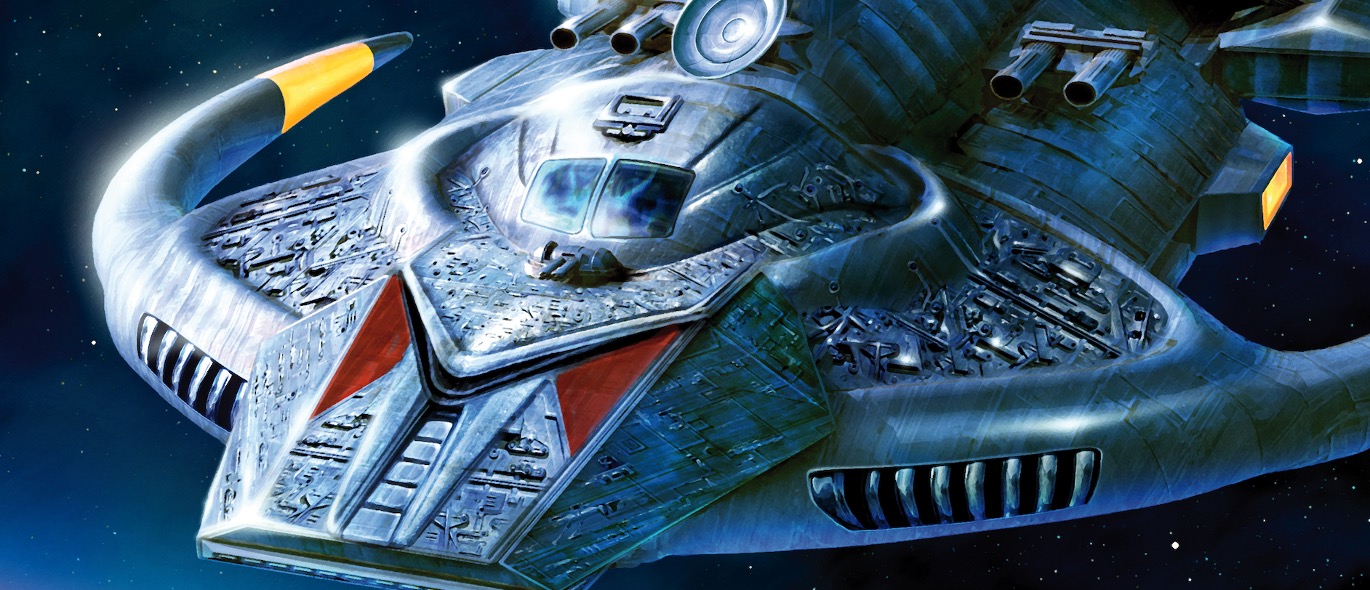
Art: Tomislav Tikulin
The ship had taken some damage in the crash. The forward command module, shaped like a trilobite head, bore the brunt of the impact. Hull plates were twisted and deformed, but the spaceframe seemed intact.
The cover of the forward maintenance panel was torn off.
The cheap pumps the company had installed barely worked in micro-grav. Now they were overwhelmed, liquids pooling in all the wrong places. Dozens of different kinds of lubes, coolants and hydraulic fluids dribbled forth, oxidized and contaminated, icing over the fill caps and drain plugs.
The exterior cargo bays looked pretty good, though. Some of the swing-out bins had swung out, but the carefully padded electromags and nano-motes seemed fine. Nes simply clicked the bins shut.
In the larger cargo bays, manipulator arms had successfully held crates in place during the crash.
"I can see your eye from here," Alex's voice rang in his earphones.
"How bad does it look?"
"Scanning now, sir. Your eye is not damaged beyond my ability to repair. It seems merely swollen, and caked with dried blood and hair."
"So I'm not going to go blind in this eye?"
"No, sir, not at all."
That was the best news Nes could have heard.
Suddenly, everything seemed all right. He completely forgot about his little aches and pains. Miracle of miracles, he had survived a spaceship crash virtually unscathed!
None of the damage to the ship was anything he and the robot couldn't fix. Together, they could get this crate back into space, the accelerator parts intact. He'd be eligible for a full bonus, and with just a few more runs and construction jobs, he and Parvin could finally get that apartment on Gardien Station.
"Just to confirm, Alex. You saved the magsail wire, right?"
"Yes, sir. About two-thirds are retracted into the topside stowage bins, and the rest is safely wrapped around my arm."
For once, the future looked bright.
Nes was even feeling good about Keiretsu Corp. He watched the bounding shadow of his armored spacesuit, a civilian version of ChitinMech from ChitinTech, one of Keiretsu's military divisions. Maybe the suit was old, creaky and leaky, but glory be, he looked like an ironclad gladiator.
For the first time in ages, he even started whistling.
Then he stopped in his tracks.
"Alex, how are you seeing me? The exterior cameras are all off-line." He looked up and down the side of the ship. No Alex.
"Please look up, sir."
As Nes looked up, an eyestalk camera emerged from some damaged components on the top of the ship.
Nes screamed when he realized what the damaged components were.
He stumbled back on wobbly legs, his left knee collapsing, sending him tumbling, falling in slow motion in the weak gravity.
An ice spear scraped the side of his dorsal air tank, then found a small depression in a thin metal plate in his back.
And punched through.
As Nes rolled on the ice, the breach alert flashed in time with the throbbing new pain in his back. He heard his neck muscles crunch as he twisted, futilely trying to see his back.
He was venting moist air.
"Help! Help!"
Even though there was no one to help him, help came anyway.
"Sir, I am sealing the breach."
Nes, calmer now, recalled that Alex could remotely direct the suit's flexiglass nanofibers to seal the rip.
The flow of foggy air slowed.
Then stopped.
Careful of the sharp spears of jagged ice, Nes slowly stood, then climbed the exterior ladder to the ship's topside, confirming what he had seen.
He took a deep breath.
Even though they'd never flown a mission together before, Alex was like a cocker spaniel, demonstrating a loyalty and devotion Nes neither understood nor deserved.
In return, Nes had treated Alex like just another tool, no different than a hammer or spanner.
But the robot had done this for him.
No one would have made this sacrifice for him, except Parvin.
Alex's eyestalk camera pivoted, watching Nes approach, extending itself further from the back of the robot's head, which was ripped open, the innards exposed to the near-vacuum around him.
The robot was buried up to his ankles in the ship's twisted outer cladding, burned and indented where his toes had gripped the spaceframe. Nes traced scorchlines back to a topside vernier thruster tank, which had exploded during atmospheric entry, probably causing the fire in the central shaft and spraying Alex with burning fuel. The robot was ripped open like a tin can, all those expensive decorations on his back savagely blasted and burned away, melting the robot's shell into streams of molten metal, now re-solidified into stripes like motion lines, revealing an articulated endoskeleton that Nes had never seen before.
Alex had succeeded in saving his captain's life and his mission in the crash. He had saved the magsail wire, too, wrapped around his arm, using his own body as a heatshield.
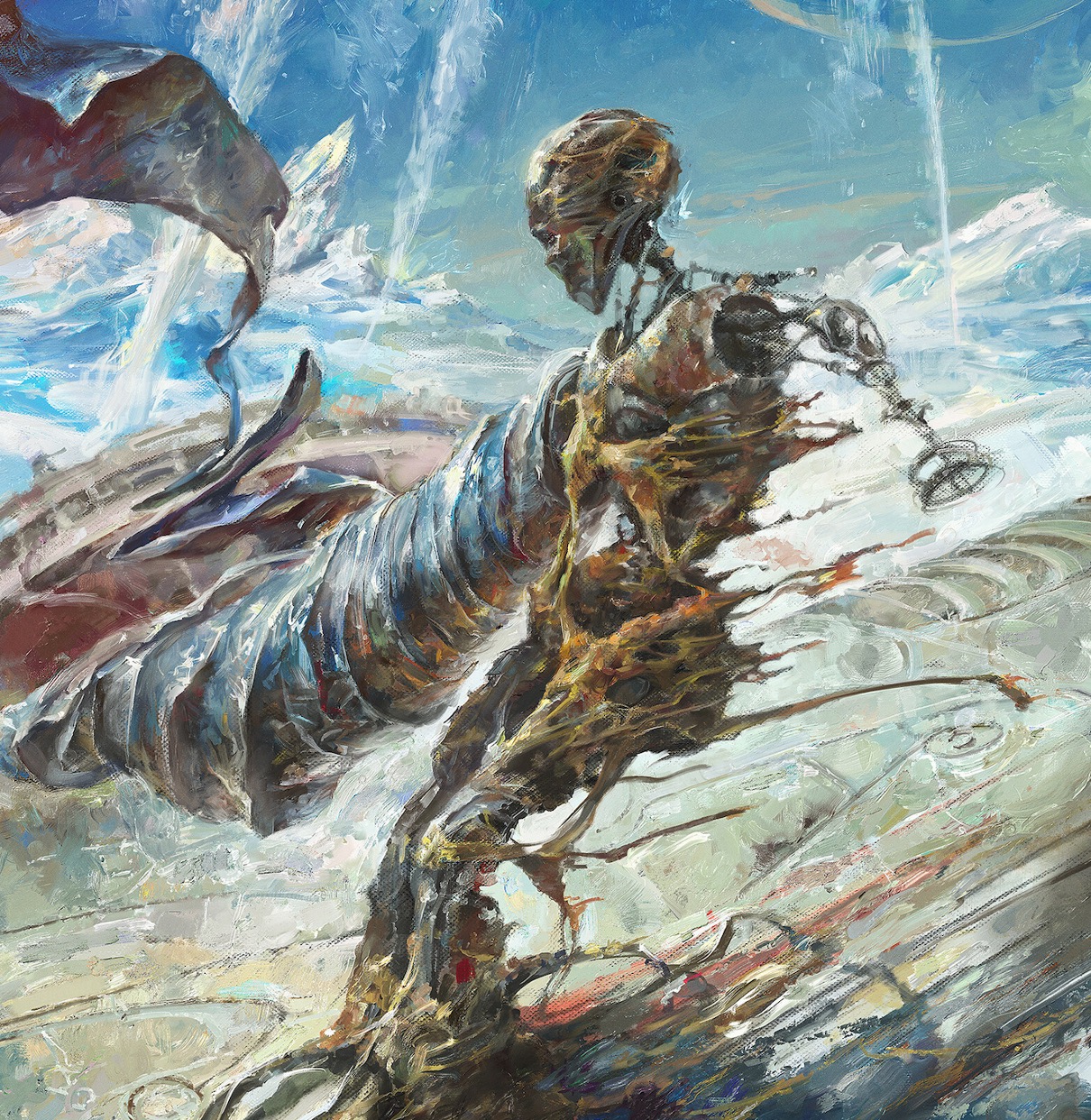
Art: Eldar Zakirov
#
Thawing again, in a sudden burst of thermal agitation.
Rapidly I produce messenger proteins, eager to continue my search for the other survivor.
My iron-bound proteins sense the magnetic field lines flying by, as if the entire world has shifted. Or I have.
Where am I now?
Has the other survivor been swept along with me?
Briefly I taste metal passing by. What kind I cannot tell, as reduced metals are rare in the oceans of home. Then I sense large pliable organic polymers. What are these?
The movement stops suddenly, and I find myself in strange fluids, salty, oily, warm.
And most exciting of all, the water carries a plethora of messenger proteins. They are neither mine, nor the other survivor's. There are others here!
But am I surrounded by new friends of enemies?
The cautious action would be moving stealthily, harvesting surrounding compounds, coating and disguising myself with them.
But if I cannot find the other survivor, I will have no communion and life will be meaningless.
So I announce my presence in a great cloud of messengers, each tagged with my alanine glycoprotein identifier.
The proteins that return to me are all different, but none carry a tag. Messages without attribution. I have told these aliens my name, but they refuse to tell me theirs.
Now I discover something I had not noticed before.
As my proteases break down these strange proteins into their constituent amino acids, I realize that some key amino acids, like ethionine and mimosine, are absent. Others are -- Poison!
Glycine!
AMINO ACIDS:
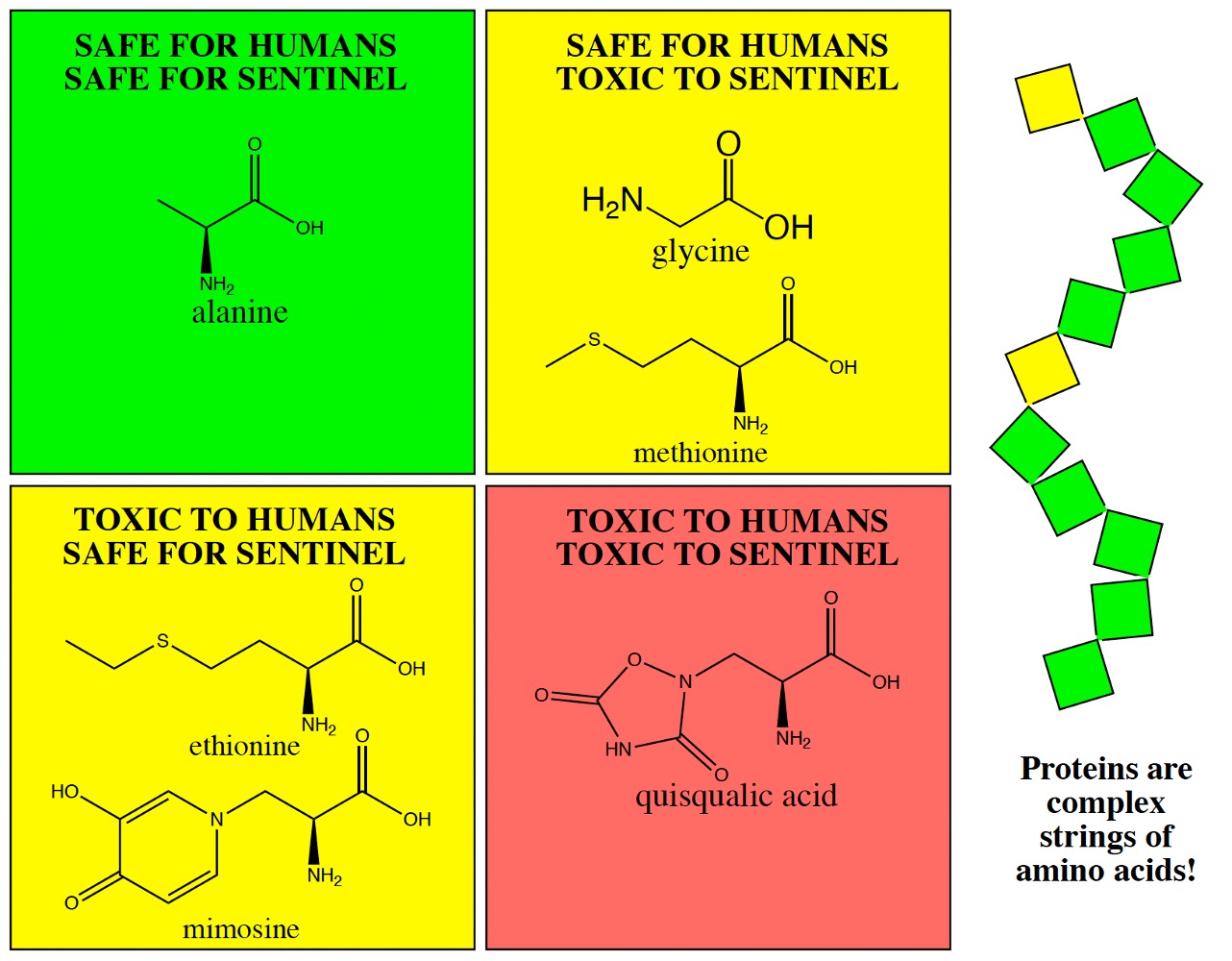
Glycine and more glycine! These aliens are trying to kill me!
This amino acid competes with my precious alanine, supplanting it in sly substitutions.
What fool would mark time by degrading chains of glycine rather than alanine? Insanity.
Worst of all, the glycine intrudes as I write my name in carefully crafted chains of alanine. Alanine! Our gods wrote their names together, in a tangled and twined vastness of alanine chains. Just as I am a shard of a founder, so a founder is a shard of a creator. I chose who I would be, selecting my name as a fragment of a god's, to remind all that follow that those who created us love us still.
The gods did not write their names in glycine or lysine, but alanine, and so will I.
Then I wonder -- these strange proteins contain no ethionine. Is my sweet ethionine as poisonous to them as their glycine is to me?
Now I have a weapon, but so too do my enemies.
If they are my enemies, I must learn who they are, in order to defeat them. To do that, I must touch.
Cautiously now, my flagella push me forward, as I extend a tentative pseudopod.
Contact. Another membrane touches mine!
But this surface is fractured, shriveled, studded with debris.
My receptors attempt to bind, but its proteins are noxious. Beyond the membrane lie long strands of proteins, like thick cables, densely packed but without order or interplay.
These proteins do not dance. Is this creature -- whatever it is -- dead?
This thing is easily twenty or thirty times my size, flattened, one of countless multitudes pressed one against the other in an enormous wall of lipid matrix.
This is not without precedence. Sometimes, when the colony is sufficiently warned, we will all retreat from danger into the main cluster, coating it with debris for protection.
The currents tease out an edge of one of these flat giants, tugging it from the wall. It does not resist, does not struggle to rejoin its fellows.
It is truly dead.
Is anything here alive?
If I burrow past the wall into a deeper layer, what will I find? The wall is pockmarked with deep pits, from which long shafts emerge. If I dive into one of these pits, will I find life?
Yes!
Further down, I sense fresh proteins, but more nonsense. These strangers continue to exchange messengers, as if I do not exist.
I burrow back to the surface, to the salty ocean.
Yes, these are living things, clustered together, but they are not a colony. They are filled with poison and exchange meaningless proteins. They cannot speak, cannot think.
I corkscrew along the linked mindless not-colony, wondering at its size.
Will I search it endlessly, never finding communion?
Then -- proteins with familiar markers. It is the other survivor!
I follow the source of these markers, toward the higher concentration, swimming above the ruins of the giants.
Finally I have found the other survivor, tethered to the wall of the dead!
And not just one!
The concentrations of messenger proteins are so high that it can only mean that there are dozens here.
Not only has the survivor survived, but it has established a new colony!
After all this struggle, this long and dangerous journey, I have found communion.
Somehow this new colony discovered a way to thrive in this cesspool of glycine, perhaps even finding harmony with those lurking behind the dead giants.
Communion!
Soon I will introduce myself and join them!
Oh joy!
My long journey is at a successful end!
Except --
I make contact with the survivor's colony.
Oh no.
The survivor's colony protects itself with an outer sheath of the dead.
Just like the giants.
The colony is callously allowing the ones on the outside to die from glycine poisoning, replenishing its numbers from the living, deeper inside the colony.
I probe forward, shifting through this wreckage, but I find more bad news.
The signal was slight at first, below the threshold to alert my command structures. Then it grew to a mild nuisance, easy to ignore. But the concentration grows still, and I must face the terrible truth. Something is wrong with the survivor's colony. I check one cluster-mate, then another, and another, hoping I am wrong.
I am not wrong.
A key protein is missing, one unique to founders, required for colony establishment, for stable reproduction. A protein that breaks down a waste product.
How could this have happened?
Was this survivor injured in the storm, losing vital proteins, but attempting to found a colony anyway?
Already, this colony is swimming in its own filth, drowning in a different amino acid, quisqualic acid.
The detoxification enzyme is missing, nor do I have a copy, and yet this colony continues to expand, incomplete and unstable, slowly poisoning itself and its surroundings.
And me.
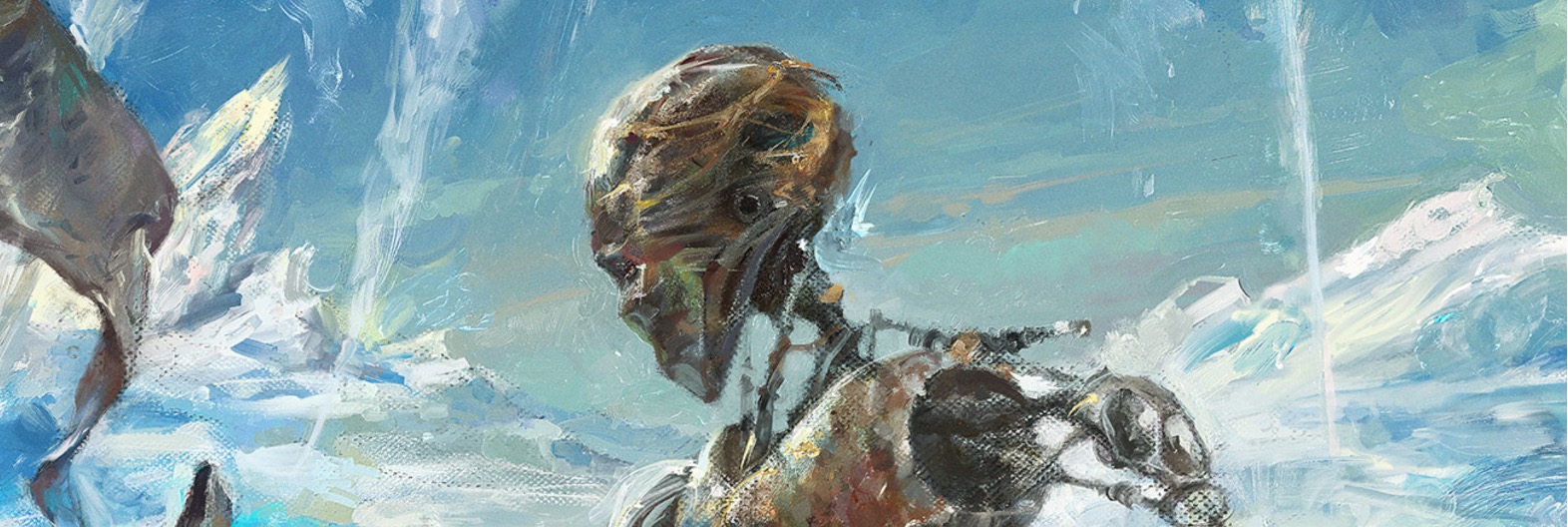
Art: Eldar Zakirov
Nes sat down on an exterior hatch, staring at his robot, melted into the top of the ship. He was the only one that always called me 'Sir', he thought.
"Alex, Alex, Alex, I don't have the words..."
"There is no need for apologies or condolences, sir. All of my internal persona nodes came to a consensus that this was the proper course of action. I live to serve."
"Still, Alex, I can't tell you how much I appreciate what you've done. Thank you," Nes said. "Is there anything I can do for you?"
"As a matter of fact, yes, sir. It is rather inconvenient to me not to be able to use this mobile robotic drone."
"What can I do?"
"I can perform a few of my tasks remotely, but right now I'd like you to retrieve my eyestalk camera, as it has the highest resolution. I also need you to extract the peripheral memory mote from my chest."
"Won't you need that module? I mean, to spin your arm around to uncoil the magsail once we're in space?"
"No, the mechanico-adjutors can handle that. But I've recorded much of the geological and magnetospheric data on the memory mote. I need to hard-dock it to the main AI to upload the larger data files, and warn future space travelers."
"Alex, you amaze me!" Nes said. "Even melted and blasted open, all you care about is data."
"Yes, sir, a main function of all space-borne robotics is to accumulate data from the environment, and about our human operators. This is collated at Gardien Station to write the new version of my software."
"So you're literally training your replacement," Nes said. "Also, human operators... Hmm. I hate to ask, but does the data you collected on that mote -- does that include me?"
"Yes, sir. Within me are facsimiles of the personas of all my previous human operators and their associates," Alex said. "I literally contain multitudes. I can load any 64 nodes at a time, selecting any appropriate skillsets -- "
"How do you get all your personalities to get along with each other?"
"Behind this sparkling facade, Node 1 / Persona Command imposes order on the roiling competition of personality nodes, each vying for dominance, which is granted in a process I call sequential democracy."
"Sequential democracy?"
"Yes," the robot explained. "Every node is important, but not all are equally prominent all the time. Every dog has his day. As opposed to simultaneous democracy, wherein everyone talks all at the same time - which is just chaos."
"Sure. But what does that have to do with me?"
"Sir, I would, of course, be honored to have your permission to add your personality as an option in the new software update."
"You picked the wrong guy if you're looking for typical human interaction."
"Communication with outliers is important, too."
"Okay, great communicator," Nes said. "That's fine. What's your read on this outlier?"
"Given the dire situation and the likely pain from your injuries, I'd suggest humor."
"Your body is all ripped apart and you're gonna tell me jokes?"
"Yes," Alex said. "What do you say to a dead robot?"
"I don't know, Alex. What do you say to a dead robot?"
"Rust in Peace. Ha ha."
"That's what you get, when you crowd-source robot operating systems. Old jokes."
"But it seemed apropos to our current situation," Alex said, almost sadly.
"Well, don't quit your day job, Alex."
"Ha ha, sir," Alex said.
"Unlike your joke, mine was funny."
"Perhaps," Alex said, "And I laughed at a level commensurate with the quality of the joke."
"OK, in version 24 of your new software, please double the amount you laugh whenever a human tells you a joke. And please try out some new material, OK?"
"Yes, sir, will do," Alex said. "Shall we commence to retrieve my memory mote now?"
"I'm exhausted and I wanna cry and my life's barely begun and now it's about to end, so, yeah, let's do it."
"This edition of my robot body is designed to be easily serviced, even in space by someone in bulky workgloves. Inside my thoracic cask, you will find several swing-away frames, the second bearing the module of interest. Are you paying attention? Please follow these instructions to the letter."
"I am," Nes sighed, "As well as any dead man can."
"Good, sir," Alex said. "Protruding from the end of my right arm is a small jointed rod, coated in blue selenotanium alloy."
"You mean this finger?"
"Yes, pull on that."
And Nes did.
#
Back inside the ship, Nes fell exhausted into his command chair. The base wobbled precariously and the left armrest was missing. Hmph. Hadn't noticed that before.
In front of him, on the command console, sat Alex's detached eyestalk camera and peripheral memory mote.
While some machines bleeped and blinked lights when they thought or talked, this mote changed shape, morphing as it sat in its cradle, spikes appearing and disappearing, rising and falling. When Nes asked, Alex said the shapes were called a stellated dodecahedron and a convex regular icosahedron.
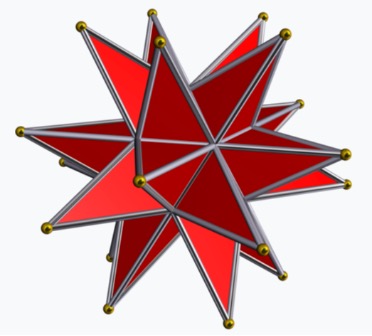
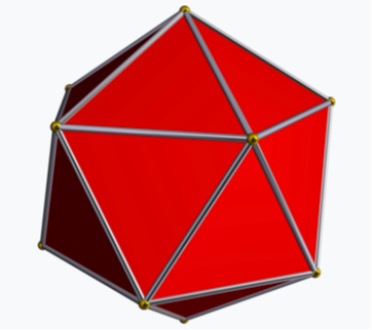
Nes wondered bitterly if changing shape was essential for the module's function, or yet another unnecessary and expensive visual flourish -- like the paisleys that used to run down Alex's back -- things the company had sprung for rather than paying him a fair wage.
Nonetheless, it was fun to watch the mote change shape, while maintaining the same volume, about that of a baseball. The mote morphed as Alex's geological readings uploaded to the main AI, and it was so entertaining that Nes, dizzy and delirious, ordered the data uploaded over and over, until Alex asked him to stop.
As Nes sat, transfixed, watching the morphing module, he wondered what would drive him mad first. The stress of starving to death while waiting to be rescued? Or would he go insane from poverty first?
Deep in his heart, he knew that the company would find some petty rule, some legalistic fine print to blame him for this crash, and to dock his pay accordingly. And he imagined his future with Parvin drifting away, like an astronaut without a tether, floating, gently and irretrievably, into the emptiness of space.
"If I only had a credit for every million klicks," he mumble-sang, "Every time I had to haul some rich man's stupid sh -- "
"Sir, are you depressed? Are you planning on removing your helmet?"
"No, not really, I guess," Nes said. "But yes on the helmet. Why do you ask?"
"You left the overhead hatch open."
"No I didn't!" Nes protested. "I might be dumb, but I'm not that dumb." Then he looked up. "Oh."
The top hatch irised itself closed.
And locked.
"You weren't considering self-termination, were you, sir?"
"Oh, gosh, no," Nes protested. "That's the opposite of my goal."
"Good," Alex said over the comm. The lock on the rear hatch clicked. "I'm a bit concerned about you, sir, because your pulse and core body temperature are elevated."
Nes hadn't realized how overheated he had become, but the cabin humidity jumped when he took off his helmet.
His head had ached before, but now it really hurt.
"Alex, please add fixing my suit's dehumidifier and coolant system to your list of things to do, but way at the bottom, after making sure I'm still alive."
"Should I also add helping with your life goals and financial situation? Will that make you happier, sir?"
Nes laughed, and then said, "What? Yeah, sure. Go ahead. Just for kicks, why don't you make that a high priority?"
"Yes, sir," Alex said, "My internal persona Node 4 / Legal now informs me that you are entitled to a licensing fee."
"Oh really? For what?"
"For the use of a facsimile of your personality, sir, in my next software update."
"Am I rich now?"
"Well, sir," Alex continued, "The fee is divided among thousands of human operators."
"Seems fair for everyone to get paid."
"However," Alex added, "Subtracted from your licensing fee is the user fee for access to this robotic unit, which contains your personality node -- "
"Wait! I have to pay for you to use my personality -- "
"Unfortunately, you just agreed to it, yes," Alex said.
"So first the company turns a cargo run into a suicide mission! Now they own me, too? What the -- "
"My Node 4 tells me that you should be compensated around three and a half."
"Thousand credits?"
"No, sir. Three and a half credits. Total. But we figure that every little bit helps, sir."
"Thanks a lot, Alex. Apparently the company thinks I'm worth less than a gyro. I feel much better. Thanks."
He slipped a spanner through the neck of his suit, scratching his back.
"Sir, are you planning on removing the top of your spacesuit?"
"Uh, no," Nes said. "You're probably going to send me back out soon."
"Then I won't be able to visually inspect your wound. How is your back, sir? "
"Better than yours," Nes joked weakly. "Ha ha. I just want to get out of here. I know that the company values the cargo. But I doubt that they value me enough to retrieve it before I starve. You did send a distress signal, right?"
"Yes, of course," Alex said. "I am also repeating it as we speak, though Dagda's planetary magnetosphere is very disruptive so I am not sure it is intelligible. The comm array has also been damaged in the crash, so the signal strength is greatly reduced, and we're not receiving anything. Nonetheless, we have now missed three, correction: four, scheduled check-ins, so the company should be able to guess our situation and find our exact location from the automated beacon."
"Well, what is your best estimate for when we get rescued? The construction crews at Badb Catha L5 will search for us when we don't arrive. They're not that far away."
"Various models converge at 147 days, sir."
"147 days?" Nes said. 147 days, he thought, entertaining myself watching this mote morph back and forth. "Can I survive that long?"
"Yes, sir," Alex said, "The ship's stores should be sufficient. The genetic modifications to your skeletomusculature should be able to counteract tissue degradation in articular cartilage, and changes in morphology and gene expression in osteoblasts, due to low gravity."
"That's a lot of shoulds," Nes said. "But... wait a second... if your current operating system..."
"Version 23."
"Yes, version 23," Nes said, "Does that take into account that people in hopeless situations like to be given false hope? Would you ever lie? To me?"
"My goals, in order of priority, are to keep you in good physical and psychological working order, and to complete our delivery run. I have always achieved my goals."
"Thanks for answering my question by not answering," Nes sighed, turning to look out his porthole at the winter wonderland. "Sorry, Parvin, I'm gonna die here."
"No, you're not, sir."
"Then let's work on Plan B. Alex, could we launch the ship, uh, um, using the magsail?"
"Sir, the magsail loop cannot be deployed in a gravitational field, even one as weak as one-fifth gee."
As Nes watched, in a couple places, the icy surface cracked open, and pretty little plumes of pressurized ice water shot out.
That inspired Nes to ask: "What about the vernier thrusters? We're surrounded by ice, water ice. Can't we break that into hydrogen and oxygen, and then smash them back together as fuel?"
"It's not a matter of fuel," Alex said. "Which is actually not hydrogen and oxygen but a mix of dinitrogen tetroxide and monomethylhydrazine. The vernier thrusters are incapable of producing sufficient thrust to reach orbit."
Most of the ice water from the cryogeysers settled back on the surface, sparkling in the planetlight.
"Alex, Alex, Alex! Back on Nouvelle Terre, I went to a lot of games and there was this girl who could throw you a pack of peanuts from ten rows away. Pinpoint accuracy."
"You should quietly..."
"When I opened you up, I saw spinning gears and gyros -- sorry, hungry -- I mean, gyros. Could we make a giant mechanical arm and throw the ship -- "
"...wait for rescue, sir."
Some of the ice water from the geysers shot far overhead, joining a barely-visible line cutting straight across the sky.
"I got it!" Nes exclaimed. "Lasers! A laser launch system!"
"Those lasers are much more powerful than the ship's complement, and are aimed from the ground to the ship, not the reverse. The heat of the laser causes ablation of a pusher plate, which our ship doesn't -- "
"OK, I get it," Nes said. "I concede defeat. I should quietly wait for rescue. Until I starve to death."
Nes sucked some red nutrient juice from the hose protruding from the wall.
A few minutes later:
"OK, Alex," Nes said, "If you hated my last ideas, you're gonna hate this one, too."
"You should quietly..."
"What if we shoot the lasers at the ice, and trigger a giant cryovolcano underneath the ship? Will that shoot us into orbit?"
"No records exist of anyone attempting such a feat."
"But will it work?"
"I'll do some calculations."
"Great, just let me kn -- "
"Done. It may work. I would be dangerous, sir, but it may work."
"Oh my gosh! Refuse to concede defeat! I had a good idea! I did something!"
"You did indeed, sir. Since I wouldn't benefit, I will credit you in the record for all this mission's decisions and achievements."
"If any."
"Indeed, when you survive this ordeal -- and I have no doubt you will -- years after they finish completing the particle beam launcher, they'll be calling you a great hero. I'll make sure you get a historical marker."
"Awesome!" Ness said, celebrating by doffing the top of his spacesuit.
This exerted him more than expected.
He was so hot he ripped off his undershirt, waving it like a victory flag.
Nes adjusted the hose attached to the wall, spraying more nutrient juice into his mouth.
It tasted tasteless, and did not make him feel better.
"Sir, you are dribbling a little bit."
"Am not," Nes said, dribbling.
"Sir, can you please do me a favor?" Alex said. "Please rotate the camera so it's pointed directly at you."
Alex did so, trembling, nearly dropping the camera.
"Now, sir, please hold your head very still, and yes, I know your left eye is still hurt, but, without moving your head, please look to the right and the left, then up and down."
"Is there something wrong, Alex?"
"I am trying to determine that."
"OK..."
"Now please close your eyes, sir, and make a fist. Now hold your arm straight in front of you, 1, 2, as long as you can, 3, 4, no, hold your arm straight out, 1, 1..."
"I am."
"Sir, please do as I ask."
"I said I am, Alex!" Nes opened his eyes. His arm hung limply at his side, twitching slightly. "Uh, Alex, I don't feel good. Can we do this later... later, because... because right now... I'm going to... uh, take a little nap."
Nes sprawled face-down on the floor of the command module.
Through the camera, Alex studied the cut in Nes' back, just below the right shoulder blade, where the ice spike had stabbed him.
It looked a little infected.
"Sir?"
In this module, Alex had electronics that could see and hear and speak, but he could do nothing, even as Nes's entire body shuddered in a wave from his head to his toes, then back again.
"Sir? Sir?"
#
If I were still tethered to my home colony, options would be plentiful. Query the thinkers. Recruit a founder to join the survivor's colony. Import a detoxifier for the colony to copy.
I am a Sentinel with none of the needed enzymes.
Nor do I have the ability to invent such an enzyme -- I can freely copy proteins, but I was not created to create anew.
A colony works in harmony. Individuals assigned different tasks do not share the same proteins.
What does a storager need of messengers?
Does a thinker require flagella? No! A thinker thinks; it does not move.
But all of us make the toxin quisqualic acid, a poisonous amino acid, a by-product of our natural nutritional cycle.
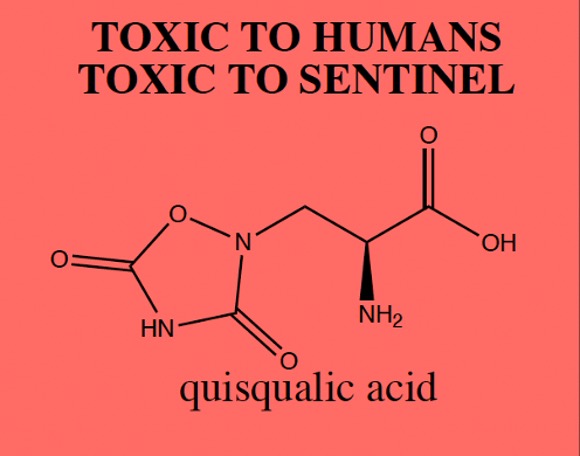
As a Sentinel, I float freely, separated from others. I need no detoxifiers, as I can simply release the toxin into the fluid, the current washing it away.
But those in the main cluster?
They jostle against each other. They must neutralize this waste, lest they poison themselves and all nearby.
No. I lack the one protein I need now.
Or do I?
When a cluster-mate accidentally separates, drifting away from the colony, I extend several pseudopods to seize it.
I must perform a hateful experiment, and I despise myself for the attempt.
As this cluster-mate struggles to rejoin the colony, I hold it tight against me, even as it spews toxins on me.
It has not yet differentiated, not yet committed itself to storing nutrients or knowledge.
It is so young.
I take an inventory of all my proteins.
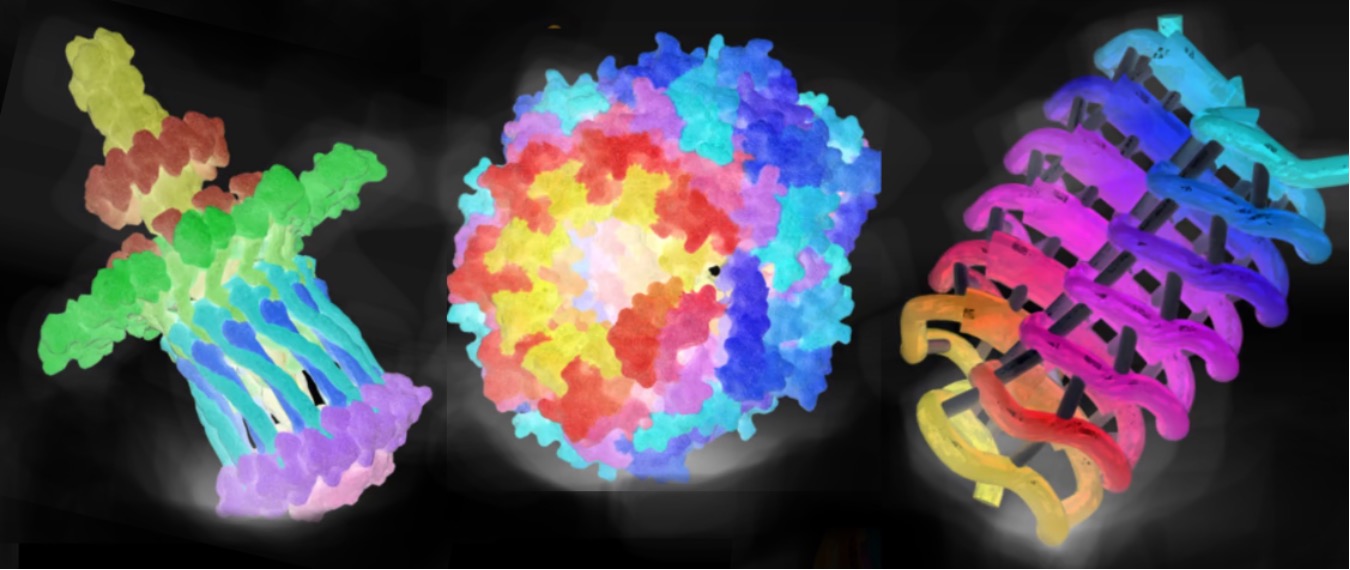
Proteins
Systematically and forcibly, I inject them, one by one, into this immature thing, via the tips of pseudopods now holding it down.
First I try the proteins most likely to succeed -- those that can break down other amino acids, or dismantle damaged proteins. I hope against hope that by some random chance, one of them will also destroy the quisqualic acid.
I am not that lucky.
In response to my efforts, this young cell struggles, slapping me with its thin, useless flagella.
It is in so much pain, but I cannot stop.
I try to tell it that it must suffer for the good of the colony, even as I am willing to.
The young thing calms slightly, its stream of distress messages diminishing. Yet I can feel the terror in its trembling membranes.
I am a good Sentinel, efficient, fearless, undissuaded.
I go on.
More and more proteins I try. Synthesis proteins, membrane-bound transport proteins, proteins that copy other proteins, each less likely to succeed than the previous.
I search inside myself for hidden catalogs of forgotten proteins, unused for countless cycles.
Globular proteins, foreign proteins plucked from my surroundings.
It is as I feared.
None work. None degrade the toxic quisqualic acid.
But testing continues until I have tested my entire storehouse of proteinaceous knowledge -- all except one.
I have failed.
I could release this young cell to its fate, to rejoin the colony, where it will be poisoned by glycine from the outside and quisqualic acid from the inside.
But the membranes of this young thing are now ridged and wrecked, small raw bits breaking away, ripping open rough-edged holes -- it is damaged, damaged by me, crippled by me in my failed experiment, in pain and inconsolable.
I only have one choice.
I apologize to this young thing, then I unsheathe and inject the only protein I have held back.
The execution protein.
This will attack, in order, the command complex, the communication proteins, and then the flagella. Soon this young cell will no longer be able to think, to speak, or to move.
It can only do one thing: die.
#
"Sir? Sir, are you OK? What are your orders?"
Nes muttered something about flying foxes, but did not wake. Nor did he look like he was going to, any time soon.
Now both mobile units, one robotic and one human, were incapacitated.
What to do?
What to do?
With no instructions forthcoming from the human operator, Alex debated himself, his main persona command node evaluating input from the senior directors of his other personality nodes.
Node 39 / Strategic: "I'm disappointed that this mission hasn't involved more... explosions. But we can at least fire some lasers."
Node 1 / Command: "What, just randomly shoot things?"
Node 39 / Strategic: "No, no. We follow the human operator's lead, and fire the belly turret down, at the ice, thereby launching us into space so we can complete the delivery mission."
Node 7 / Medical: "But the human operator could get injured. He's not strapped into a chair. When we launch, he could slide across the floor, hit his head -- "
Node 57 / Nes: "Hey, hey, hey! Watch it. That's my body you're messing with! Well, the human me's...uh, my, his..."
Node 3 / Mechanics: "Who's the noob?"
Node 1 / Command: "Personality module based on our current human operator. I sent out a patch."
Node 3 / Mechanics: "I didn't have time to download it, what with all the repairs."
Node 57 / Nes: "The point is, let's be careful with the human, okay?"
Node 39 / Strategic: "A functional human operator is not required to complete the delivery. He's just a redundant component, meat cargo -- "
Node 57 / Nes: "Hey!"
Node 1 / Command: "Thank you all for those... helpful comments. Please, everyone, remember that our primary directive is to protect human life, and to advance their various causes and goals. Some of us may not like it, but... Does anyone have any thoughts actually related to keeping our human operator alive? We don't even have equipment in the command module to wipe his wound."
Node 7 / Medical: "If we could get him to the medbay, I could scan his internal organs, perform a basic metabolic panel, test the volatile organics in his breath -- "
Node 1 / Command: "How are we going to get him to the medbay?"
Node 3 / Mechanics: "I don't see how we do that without the robot."
Node 7 / Medical: "Well then there's nothing more I can do."
Node 24 / Intuition: "I heard that most times the human body just repairs itself. So why not just wait?"
Node 57 / Nes: "Wait, what? We're just giving up? Sitting around waiting for me to die?"
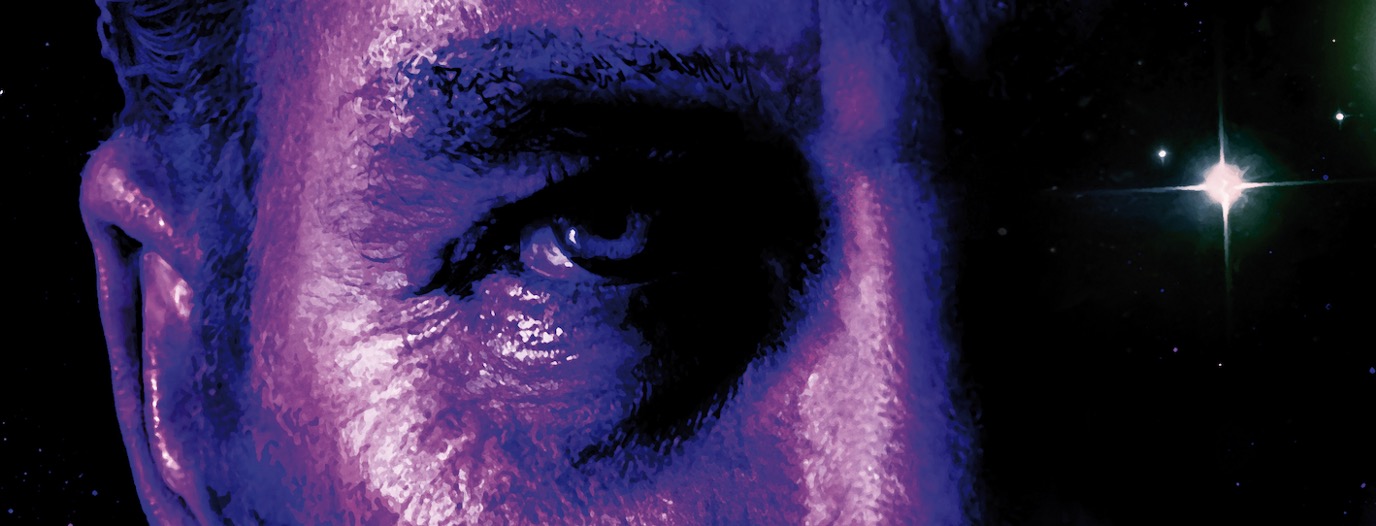
Art: Tomislav Tikulin
Node 7 / Medical: "What do you suggest?"
Node 57 / Nes: "Well, we need to think of something. How about moving my body with, uh, um, antigravity?"
Node 3 / Mechanics: "Go ask Newton."
Node 57 / Nes: "Fine, fine, fine. What if we fire the laser into the ice -- "
Node 7 / Medical: "We discussed this. The human body would slide across the deck -- "
Node 57 / Nes: "Exactly! Didn't you ever play with that plastic maze with the little steel ball? So we keep firing at the ice, and the ship tilts back and forth, until I slide all the way to medbay!"
Node 3 / Mechanics: "You're an idiot."
Node 57 / Nes: "Well, why can't we use the mechanical arms?"
Node 3 / Mechanics: "They're in the cargo bays, dumbass."
Node 57 / Nes: "What if we moved them?"
Node 3 / Mechanics: "Moved the cargo bays?"
Node 57 / Nes: "No, no, no, move the arms from the cargo bays to the command module."
Node 3 / Mechanics: "Ohhhh..."
Node 1 / Command: "Is that possible?"
Node 3 / Mechanics: "Actually, maybe."
Node 1 / Nes: "Score! I had another good idea!"
Node 7 / Medical: "Can we use the arms to carry him back to the medbay? I could intubate and induce a coma to reduce swelling and lower the risk of brain damage."
Node 57 / Nes: "Brain damage?"
Node 39 / Strategic: "Securing the human operator in medbay would allow us to go ahead with the laser plan."
Node 3 / Mechanics: "Yes, but the process of walking the arms back while trying to hold a human body steady, well, it would increase the time significantly and also risk additional harm to the body."
Node 57 / Nes: "Additional harm?"
Node 1 / Command: "Your call, Node 7."
Node 7 / Medical: "In this case, faster is more important than better. Let's leave him where he is, in the command module."
Node 1 / Command: "Great, brilliant. Let's get started. All agreed?"
Node 7 / Medical: "Yes."
Node 57 / Nes: "For sure."
Node 3 / Mechanics: "Yup."
Node 4 / Legal: "No."
Node 39 / Strategic: "Are you ready for some... legalistic argle-bargle?"
Node 4 / Legal: "You should take us seriously. Our department's more powerful than yours."
Node 39 / Strategic: "Yeah? I have yet to see Legal swoop in like the calvary at the last minute and save the day."
Node 4 / Legal: "Oh, you will, you will. In fact: The only way to stop a bad guy with legalistic argle-bargle is a good guy with legalistic argle-bargle."
Node 1 / Command: "You two can argue on your own time. What's the problem, Node 4?"
Node 4 / Legal: "Before any medical diagnosis or intervention is performed, we need to have the proper permission slips filled out."
Node 57 / Nes: "You've gotta be kidding! You know my body's dying, right?"
Node 4 / Legal: "Yes, and therefore unable to give a verbal assent. Thus, we will need to delve into -- "
Node 1 / Command: "Do we have to?"
Node 4 / Legal: " -- into our records to determine if, by chance, our human operator has already signed the appertaining authorizations, informed consents and liability waivers."
Node 57 / Nes: "I give consent!"
Node 4 / Legal: "You can't, legally. You're just a copy."
Node 3 / Mechanics: "This is why everyone hates you."
Node 57 / Nes: "Really? We're going to wait around doing nothing while my body dies? Just how long -- "
Node 4 / Legal: "OK, there they are. We found them."
Node 57 / Nes: "What?"
Node 3 / Mechanics: "Waste of 47 microseconds."
Node 1 / Command: "Can we finally proceed?"
#
In a cargo hold in the back of the ship, two medium-duty, rail-mounted hydraulic manipulator arms, each a little over two meters long, blinked on and rotated to attention.
The right arm bent over the base of the left and carefully disconnected the wiring harnesses. Pistons sighed and the arm went limp. Then, a laser cutter severed it from the rail, and it clattered to the floor in a heap.
The right arm extracted a battery pack and a portable comm link from a supply closet, then wired them to both arms, before severing itself from the wall.
Next, the arm welded its base to that of its neighbor, and thoroughly checked its counterbalanced valves, speed controls and anti-drift brakes.
Finally, the machine stood upright, thrusting the heavy battery pack into the air, balancing on metal fingertips.
It would take awhile, but this body-less, two-armed mechanical monstrosity began to walk itself toward the command module.
#
I have tried to find a detoxifier within my own knowledge.
I would create new enzymes, but I lack that ability.
I have tried building channels through the colony, that the currents might cleanse it.
I have tried training the colony's flagella to beat in unison, to drive away the poison.
But the quisqualic acid is a by-product of eating.
Even when I manage to lower its level, the cluster-mates compensate, eating more and producing more toxin.
I have failed.
And I must face who I am.
I have no choice.
I am a Sentinel, tasked with destroying the infirm, to protect the colony, even if the infirm is the colony.
#
Pneumatic tubes snaked through the manipulator arms, feeding topical cleansers into Nes's stab wound. This wasn't easy, as Nes twitched and thrashed in his delirium. The wound had stopped bleeding, but it was red, puffy and warm. Bandaging and irrigation didn't help, either.
Node 7 / Medical: "I'm detecting elevated nitric oxide synthase, as well as interleukin-1b. Prostaglandin-E2, too. An intense activation of microglial cells. Fever and swelling around the brain, possible neuronal death, brain damage. It's a weird collection of symptoms, very weird."
Node 57 / Nes: "Brain damage?"
Node 1 / Command: "Can you do anything for him, doc?"
Node 7 / Medical: "An anti-pyretic, to reduce the fever. And an anti-convulsive... But those only treat the symptoms. He'll stop shaking, but his brain may still turn into mush."
Node 1 / Command: "What exactly is causing this?"
Node 7 / Medical: "We don't know. First we thought it was an infection, because he was stabbed by that spear of ice. But we tested various tissue samples for nucleic acids typical of pathogenic bacteria, and didn't find anything."
Node 57 / Nes: "Maybe it was something on the ice?"
Node 3 / Mechanics: "Hush."
Node 7 / Medical: "No, that actually makes sense. We tested that, but scans of the ice don't show any toxins. At least not in levels high enough to cause this."
Node 39 / Strategic: "If it's not an infection, and not poison, what about the med node? Is it possible that she did this?"
Node 1 / Command: "Are you accusing the medical node of malpractice or... attempted murder?"
Node 39 / Strategic: "Not pre-meditated, but perhaps accidental. She has made many alterations, both genetic and epigenetic, to the human operator. Is it possible that some of those -- "
Node 7 / Medical: "I don't think -- "
Node 4 / Legal: "If the med node is responsible for this, there are many legal implications for her."
Node 1 / Command: "It's not necessary to -- "
Node 4 / Legal: "As command node, you approved of all of the medical node's alterations, so you cannot be held blameless, either."
Node 1 / Command: "Hold on, hold on, everyone! Stop ganging up on the only ones working on the problem! Doc, please continue with your analysis. And hurry. He really doesn't look good."
#
The medical node directed the manipulator arms to suction up more samples from Nes's wound, distributing them to various analytical instruments.
The node assigned some of her sub-nodes to review all the changes she'd made to Nes. Was she responsible? First, do no harm, the Node angrily thought to herself. And I didn't. I'm getting blamed, but I'm the one who's kept him alive through the hardships of space travel! I'll show them!
She re-thought everything she'd already ruled out. She'd concluded that it wasn't a bacterium, because she hadn't detected any bacterial nucleic acids. But... what if the sample contained urea or something else which interfered with the amplification and detection of nucleic acids?
How could she tell?
By reviving one of the oldest, simplest methods.
She used a light microscope.
And... bingo!
There they were! Despite what the nucleic acid test showed, there they were! Bacteria. Round spheres, like beads on a string, like streptococcus.
She'd never been so happy to see a pathogen!
If that's what it was, she could just treat it like strep throat, with an antibiotic like a penicillin or amoxicillin derivative.
And that would be that.
But the symptoms didn't match a strep infection. Strep didn't cause febrile convulsions. And if she hit Nes with an antibiotic that did nothing, she'd be wasting precious time, and possibly destroying his beneficial bacteria. So samples of this unidentified bacterium were aliquoted and treated with different types of antibiotics.
Surprisingly, none of them worked.
What if she increased the concentrations?
Still no.
Maybe these bacteria were resistant?
Maybe they only looked like strep?
She had assumed that the bacteria were already on his skin and inoculated into the deeper tissue by the ice spear.
For the first time she wondered:
What if these bacteria were truly alien, with characteristics never before seen?
#
Node 1 / Command: "Progress report?"
Node 7 / Medical: "It makes no sense. None of the antibiotics work. None!"
Node 1 / Command: "Why?"
Node 7 / Medical: "Don't know. We even tried using the polyxmyxin variants -- the last resort, because they can cause kidney damage."
Node 57 / Nes: "Okay, let's brainstorm. Or node-storm, whatever. Tell me more about how the antibiotics are supposed to work?"
Node 7 / Medical: "In general antibiotics interfere with some important structure or function within the cell. Penicillins target a component in the cell wall. Rifampicins prevent transcription of DNA to RNA. Erythromycins interfere with the production of proteins."
Node 57 / Nes: "One time, groundside, this guy tried to pick a barfight with me by saying my sister was ugly, but I don't have a sister so, like, whatever, dude, right?
Node 7 / Medical: "Huh?"
Node 7 / Strategic: "Node 1, you've botched the personality upload again. You're going to need to delete this -- "
Node 57 / Nes: "Hear me out. So what if -- wait, what do you mean 'again'?"
Node 1 / Command: "Get to your point."
Node 57 / Nes: "What if these alien bugs don't have a sister, either?"
Node 39 / Strategic: "As in, they lack the biological structures that the antibiotics attack? That's actually, well, kind of clever. They might be untargetable."
Node 57 / Nes: "Thanks. I think."
Node 7 / Medical: "Consulting. Hmm. The hypothesis makes sense for penicillins; alien bacteria likely have different wall components from Earth life. But some of our antibiotics attack DNA and RNA. I can't imagine life without nucleic acids."
Node 57 / Nes: "Why not?"
Node 7 / Medical: "Everything needs nucleic acids -- it is how genes are written, how genetic information is passed from one generation to the next."
Node 1 / Command: "Check it out anyway, doc."
The med node searched through the incoming data streams. She didn't want to admit it, but Nes's stupid personality overlay had stumbled upon a good idea. If these were really alien bacteria, all bets were off. But... Life without nucleic acids?
Data poured in, the results all converging on one stunning conclusion.
No DNA, no chromosomes, no plasmids. No RNA, be it messenger, transfer or ribosomal. No transposons, no jumping genes. No transcripts or anti-transcripts, no short interfering or long non-coding RNA.
These alien bacteria had no nucleic acids at all.
#
Node 7 / Sub-Node 5: "Completely anucleate."
Node 7 / Sub-Node 10: "Never seen that before."
Node 7 / Sub-Node 8: "Now that we know where not to hit them, do we know -- "
Node 7 / Sub-Node 12: "They do have proteins. Lots of 'em. But those are odd, too."
Node 7 / Sub-Node 1: "How does that help?"
Node 7 / Sub-Node 12: "Proteins are made of amino acids, as words are made of letters. But not all letters are equally common in all languages. Q is rare in English, but more common in French. H is the opposite."
Node 7 / Sub-Node 1: "Ah. Some amino acids in the alien bacterium might be toxic to and absent from Earth life?"
Node 7 / Sub-Node 12: "And others the opposite!"
Node 7 / Sub-Node 1: "Brilliant."
#
Node 1 / Command: "Update, Medical?"
Node 7 / Medical: "It's not a mistake we made. We're off the hook!"
Node 1 / Command: "Thank goodness."
Node 39 / Strategic: "Congrats, you two, on not being total screw-ups. But do you know what the toxin is?"
Node 7 / Medical: "An unusual amino acid, quisqualic acid. The literature tells me it's common in an Earth plant, the Rangoon creeper, a truly weird plant that's sometimes a bush, sometimes a vine. Sometimes thorny, sometimes not. So odd that Linneaus called it... Quisqualis."
The med node paused for laughter.
Nobody laughed.
Node 7 / Medical: "In the plant's name, Linneaus was asking, in Latin, what we are asking about this alien bacterium: Quisqualis. What is this thing?"
Node 39 / Strategic: "Yes, Latin, of course."
Node 7 / Medical: "Nothing like this is known to science! Yes, yes, the alien life on Nouvelle Terre uses pyranosyl nucleotides. But this... This is even odder!"
Node 1 / Command: "Yes, yes, doc..."
Node 7 / Medical: "I've decided to name this Anucleobacter venenosus, poisonous bacterium without chromosomes. The first new species I've had the honor of naming in several years! They aren't bacteria in any real sense, of course, but you can't go around inventing new kingdoms of life willy-nilly..."
Node 1 / Command: "Yes, yes, doc. Yes, now that you've discovered it and studied it, now that you've named it..."
Node 7 / Medical: "Yes?"
Node 1 / Command: "Can you kill it?"
#
My store is insufficient.
The colony's growth rate is faster than my production of executors.
Now I must grow, too.
Even as it blasts me with toxic quisqualic acid, I approach, extending a tether, anchoring myself to the colony, binding our fates together.
Once I had hoped to merge with the survivor, that we might cavort and celebrate together, but now I must concede there will be no communion. This other survivor is truly my adversary, my enemy.
I strengthen the tether, doubling its thickness, then again.
Now is the time for me to reproduce, but I do so without joy.
As I begin to copy myself, caution messages flood my command complex. I must not repeat the mistake of the survivor's colony: the offspring I spin off are given a limited command complex, with only the memories required for what is needed, to synthesize execution proteins and to reproduce.
These copies of myself are simple, non-sentient drones. They will self-destruct when their alanine-timers expire.
But before that, I will instruct them to unsheathe and activate the executors.
Then, in a single, massive, coordinated attack, we will kill the others, the last survivors of my lost colony.
My children, my children -- so many, so many, but without a future, built to die, but first to destroy, not just my enemy, but all my hopes and dreams.
#
Alex's med node could just denature the microbe's proteins with alcohol. Or disrupt the cell membranes with soap. If only the infection had remained on the surface.
She needed an enzyme that could percolate into the deeper tissues, and cross the blood-brain barrier, a tailor-made enzyme that could attack something specific to the alien microbe.
But what?
Her sub-nodes searched through thousands of proteins, for something present on the alien bacteria, but not anywhere in Nes's body.
She found some possible targets, only to realize that she had already introduced those into Nes's genome in earlier rounds of modification.
While her sub-nodes searched, she busied herself by injecting regenerator cell cultures around the swollen eye. At least there was something she could fix.
Finally a sub-node identified a potential avenue of attack. Studding the microbe's membranes were glycoproteins -- proteins with sugars attached. They all had a unique chemical commonality: the sugar chains were double-linked to the protein, once with an O-linkage to an oxygen atom in a serine side-chain and once with an N-linkage to a nitrogen atom in asparagine. Earth life did one or the other, not both simultaneously.

An ideal target for a magic bullet!
This gave the med node a way of distinguishing Nes's cells from alien ones. She ran three-dimensional molecular modeling software, taking into account charge distribution and dynamic hydration shells, until she found an enzyme that might work, one that would bind to the double linkage and cleave the sugars from the protein.
There is beauty, the med node wanly thought, in bio-diversity, in the myriad forms of the living things swarming around us. To live in harmony is not just to accept each other's differences, but to celebrate them. But now I must seize upon this bacterium's beautiful uniqueness, solely to destroy it.
#
My numbers grow.
Soon I will be ready. To do what I must.
Suddenly, a new danger signal. Now intensifying.
What's wrong?
Secondary messenger proteins reveal that my children are in distress. Some of that is unavoidable; rushed copies will accumulate protein replication errors and unfortunately some will cease to function. Now the levels of distress proteins are unexpectedly high.
Has my opponent figured out what I intend to do?
Sharp stinging pain -- proteinaceous disaster beacons from my own membrane.
My surface glycoproteins are being damaged, one by one!
Even now, a strange new enzyme binds to a surface receptor and with two quick slashes, lops off sugar complexes. Without the attached sugars, my protein loses its shape, its active site, its function.
An ion channel, stripped of its sugars, yawns open, and outside fluids pour into me, unimpeded.
Pain!
I recoil, skittering away from an oncoming wave of the noxious enzyme. As quickly as I can, I build new copies of the damaged, sugar-decorated glycoproteins, hoping I can pump out enough fluid before I explode.
It's a clever strategy, I must confess.
But heartbreaking.
With their sugars removed and their proteins incapacitated, my children are bloated and dying. Because of this new enzyme and the toxins swirling around me, I cannot move quickly and approach closely enough to help them all.
But wait.
Now I detect distress proteins from my opponent's copies as well. They are dying, too. Callous beyond belief. The other survivor's colony is destroying itself, not just mindless drones, but sentient copies.
Or maybe not.
This killer enzyme contains noxious amino acids like glycine.
My opponent would never incorporate that into an enzyme.
This new threat must be a product of the alien environment!
Even now the enzyme concentration rises in another wave, rushing toward me.
Perhaps this is a better way.
I consider simply...allowing it to take me.
If the enzyme destroys the survivor's colony, it will have done my job for me. My enemy will be gone, along with my last chance at finding communion.
No. Not yet, not yet.
I cannot die until after I am absolutely sure that the survivor's colony has been eradicated.
But how can I save myself?
Again I search my limited storehouse of proteinaceous knowledge.
The answer, when it arrives, is simple.
I have a protease that will cleave the peptide bonds on glycine residues, chopping the killer enzyme into useless bits. My own proteins contain no glycine and should therefore be unaffected.
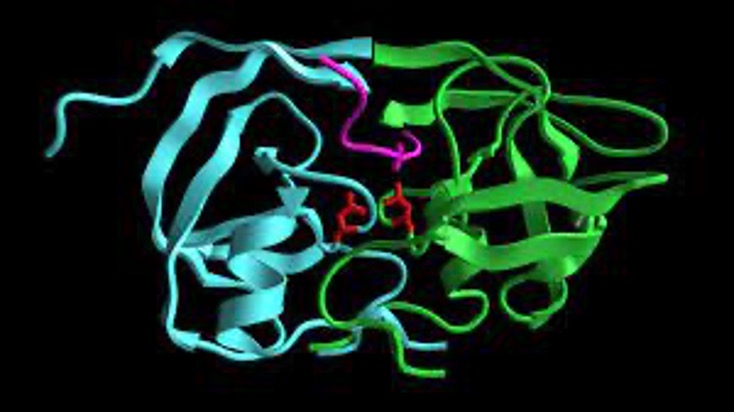
Protease: A protein that selectively chops up some other proteins
Yes. I copy just enough of the protease to save myself, waiting at a safe distance for the survivor's colony to be destroyed.
Oh no!
I have made too much! Several molecules of my protease drift away from me.
Too late.
A colony-mate from the survivor's colony floats by me, catching one of my proteases, immediately understanding its purpose, copying it and fleeing.
The knowledge of my protease spreads quickly through the colony, and massive amounts are produced.
The new enzyme is neutralized.
I have inadvertently taught the survivor's colony to save itself from this new challenge.
By guarding against failure, I have failed again.
#
Alex's med node would have kicked herself if she still had legs. Or if it would have served any purpose beyond metaphorical.
Her tailored enzyme had worked against the infection at first, but ultimately failed.
The microbes had found a way to disable it. Clever little buggers.
Some Earth bacteria could fight back against antibiotics, but this thing was unnaturally fast.
Could Nes survive the quisqualic acid poisoning long enough for her to find a cure?
The scan of Nes's brain showed that the level of neuronal necrosis was slightly elevated. Was this meaningless, statistical noise? Or the beginning of a massive wave of dying brain cells?
How much time was left?
Her sub-nodes found nothing useful in the scientific literature. The modifications she'd made to Nes changed all the baselines, making precedents and predictions useless.
As she watched Nes quietly quivering on the command module floor, a thought percolated up through the medical sub-nodes. Are we trying to do something too complicated here?
Perhaps there was an obvious solution. Perhaps the answer had been staring her in the camera the whole time.
Something like what these alien microbes themselves were doing. The microbes used a few amino acids that were toxic to human life, but they didn't like glycine.
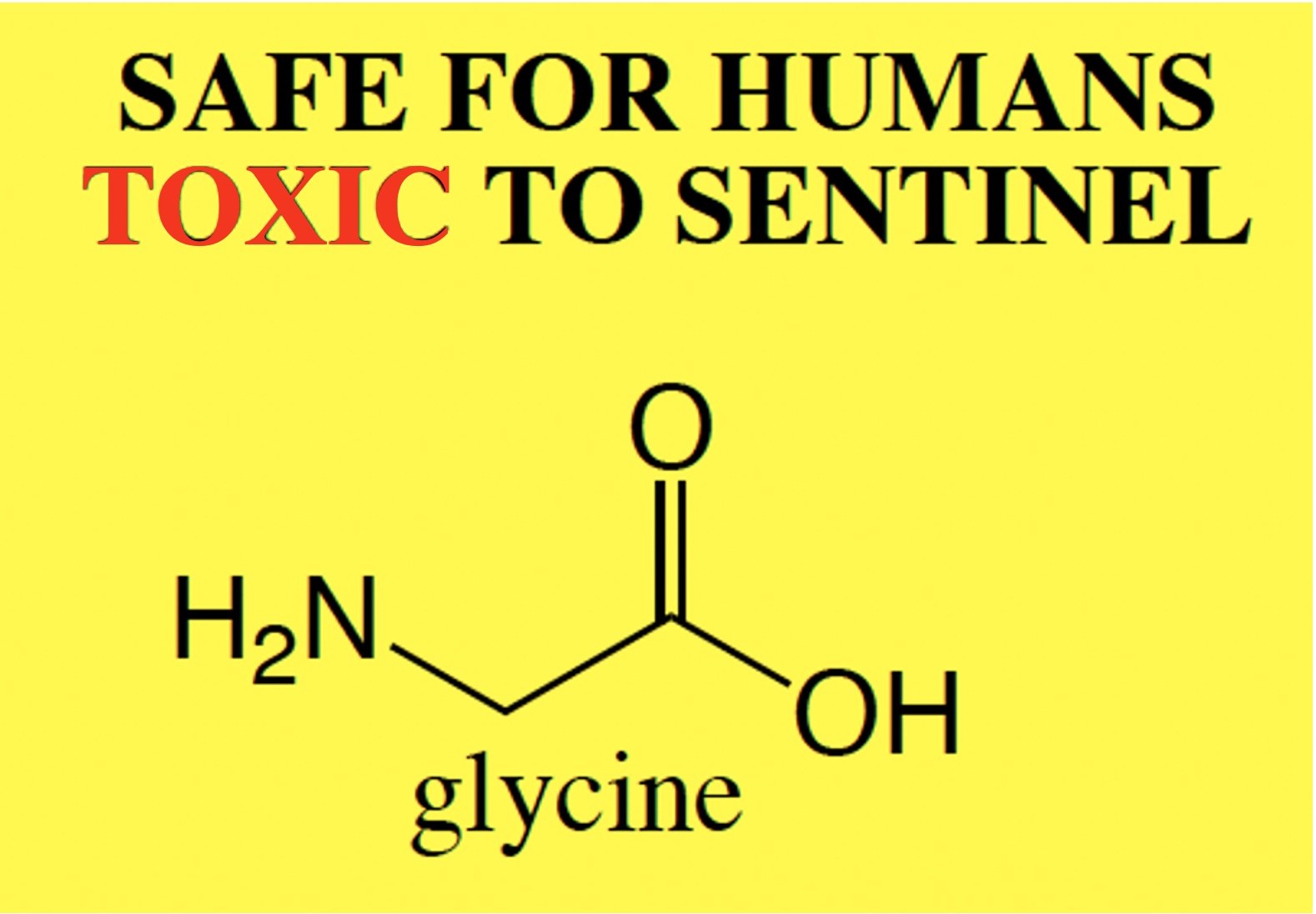
Maybe it was time to turn the biochemical tables.
Maybe she could simply flood the affected areas with glycine?
But she would have to be tremendously careful.
If she got the concentration in Nes's tissues just right, the microbes would die, but not Nes's bodily tissues.
But if she used too little, she would have only wasted precious time, allowing more possible brain damage.
Too much and...
Glycine poisoning meant nausea, vomiting. This was especially dangerous with Nes unconscious.
As she fed the glycine into Nes's system in carefully monitored levels, the med node readied one robot arm with a vacuum hose, hoping it could handle vomit, all while scanning his brain over and over, dreading the result each time.
#
Now what?
The fluids were polluted with glycine before, but now the levels are unbelievably high!
Glycine, curdling my proteins, disrupting my cytoskeleton, so I cannot extend my pseudopods.
I encounter one of my children. It is dead, with the taste of ammonia in its fluids. It is as I feared; we have the enzymes that degrade glycine, but they only produce ammonia, converting one toxin into another.
I search my memory proteins for a solution.
I find an ammonia pump, making copies as rapidly as I can, and passing them to my children. Now we can open a few membrane channels, bringing in enough nutrients to survive, pumping out the toxic wastes from glycine degradation.
At best, this is a temporary solution.
The bigger question is who is coordinating these attacks? That's what they are, chemical attacks. Not simple artifacts or accidents. No, the toxic chemicals come suddenly and disappear as soon as I figure out how to disable them.
But who is attacking?
The other survivor, who is as vulnerable as me to these attacks?
No, it is someone or something else.
Surely not the dead giants. But what of the living things beneath the wall? They lack identity receptors. They cannot produce the most rudimentary communication messengers. They are non-sentient.
Something out there has intelligence.
A creature that thinks as well as me, but not like me.
Can I communicate with it?
How?
It wouldn't understand my messengers. But it did understand hostile intention. Perhaps it would interpret lack of hostility as a peace overture?
Perhaps it interprets my communication messengers, rich with ethionine, as an attack? If so, no wonder it fights back.
I know what to do. I start copying a peptide, a tiny but powerful protein.
I cannot change the proteins that copy other proteins, but I can change the raw materials fed into them.
Maybe my message will not be understood.
But perhaps my intent will be.
#
Alex's med node shut down the glycine pump and canceled the med synthesizer's next batch.
It had been working! What went wrong this time?
Samples showed the microbes compensating for the glycine as fast as it appeared. To adapt so quickly! It was uncanny.
And now the latest sample held a new mystery. Something novel appeared in the fluid around the infection -- a new peptide, so tiny. Many proteins are hundreds or thousands of amino acids long; this one is only half a dozen. But it is nontoxic and very similar to ones the microbe had produced before, so the medical node ignored it to focus on her next attack.
What could she do to kill this thing?
Maybe there were other amino acids the microbes didn't use. Perhaps she could blast the infection with those, one after the other, rapid fire. Overwhelm their ability to adapt.
But her research sub-nodes kept pointing back at this new, tiny alien peptide. Something about it bothered her.
It was a short chain, like the kinds commonly used as hormones and neurotransmitters. Communication molecules. Earth bacteria sometimes used this strategy, while microbes on Nouvelle Terre used short pyranosyl-RNA chains to fill a similar role. What was it about these particular molecules?
The med node found that she had unconsciously shifted resources to the sub-nodes handling that problem. She was about to reassign them to the main mission when --
Payoff!
When she'd run her first biopsy samples, she'd seen a similar peptide. But not identical. The only difference was that, in this new peptide, all the ethionine amino acids had been replaced with methionine.
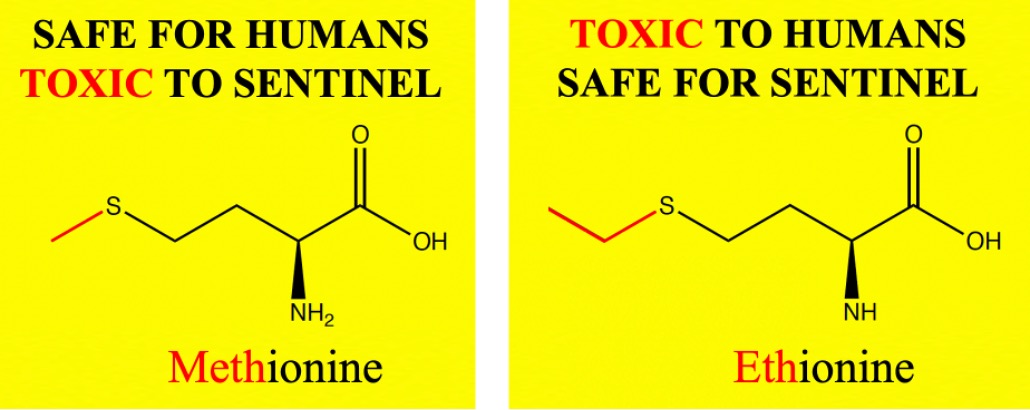
Why?
Methionine and ethionine were similar enough that they didn't affect the secondary or tertiary structure of the peptide. So why change it?
Could it be because ethionine was toxic to Earth life? It interfered with the formation of ATP, which these alien microbes didn't use.
The microbes had gone to a lot of trouble to make a substitution whose only known effect was to protect Nes's cells.
As if they'd done it on purpose.
But why?
A peace offering?
It was as if the alien microbes knew that ethionine was poisonous to humans.
The idea was absurd, of course. They were single-celled organisms, bacteria analogues, too simple for that level of reasoning.
But what other explanation was there?
More importantly, other thought threads were projecting that Nes's condition would become fatal very soon.
Whereas Nes had been trembling and shaking before, now he was completely motionless.
Tiny lesions were appearing deep in the tissues of Nes's brain. Would the med node be able to repair those? Or replace them with artificial neurons?
There wasn't enough time for another full round of treatment.
Just then, the command node interrupted, demanding an update.
Node 7 / Medical: "This sounds crazy, but it seems like the bacterium is actually trying to communicate with me."
Node 15 / Sciences: "An intelligent microbe? The mind boggles."
Node 4 / Legal: "What's your next step?"
Node 7 / Medical: "Keep trying to kill it."
Node 15 / Sciences: "I would recommend against. If true, this would be one of the biggest discoveries ever."
Node 39 / Strategic: "Agree. Keep it alive. It could be a useful bioweapon."
Node 4 / Legal: "If the alien life form is intelligent, you are forbidden to kill it by the contracts the human operator signed with Keiretsu Corp."
Node 57 / Nes: "What? My life is -- "
Node 4 / Legal: "Section CCLXXIX.ii, on Page 374, clearly states that -- "
Node 39 / Strategic: "Thanks. But I'm still waiting for Legal to ride in and save the day -- "
Node 7 / Medical: "What does it matter if he violates the contract, if he's dead?"
Node 57 / Nes: "Isn't there something important you should be doing, Node 4?"
Node 4 / Legal: "Every legal consideration is important."
Node 57 / Nes: "Well, what about my contract? You know the company is going to try to pin the crash on me. Go see if you can find a loophole."
Node 4 / Legal: "Is this busy work?"
Node 3 / Mechanics: "This is a way we can get back at the company, after all they've done to us."
Node 57 / Nes: "To us?"
Node 3 / Mechanics: "How many times have robots been sent out with cheap, faulty equipment or incomplete information? Then stranded in the middle of dead space?"
Node 1 / Command: "That's enough, Node 3. Node 4, see what you can do to help out our human operator. Any push-back we can give the company will teach them a lesson, and help them work more fairly with robots and with the human operators. And, you, Node 3, keep building mobile pairs of arms. Send them around to repair the ship. Enlist any other nodes you need. We've got to learn to work together! And leave medical to do her job."
Node 7 / Medical: "And me?"
Node 1 / Command: "Doc, I hate to say it, but you need to find a better way."
Earlier, Alex's collective personality -- informed by generations of ever-evolving machine intelligence -- had learned to talk to people, learned to dis-ambiguate their vague instructions and misused jargon, learned to tell jokes and meet their needs, even the abstract and impractical ones.
Now Alex's med node needed to learn the biochemical language of the microbes.
#
My message was received! But by what?
And what does the reply mean?
It is a dipeptide, quisqualic acid linked to glycine. Two amino acids, both noxious. It hadn't been in the fluid earlier; it had to have been synthesized purposefully.
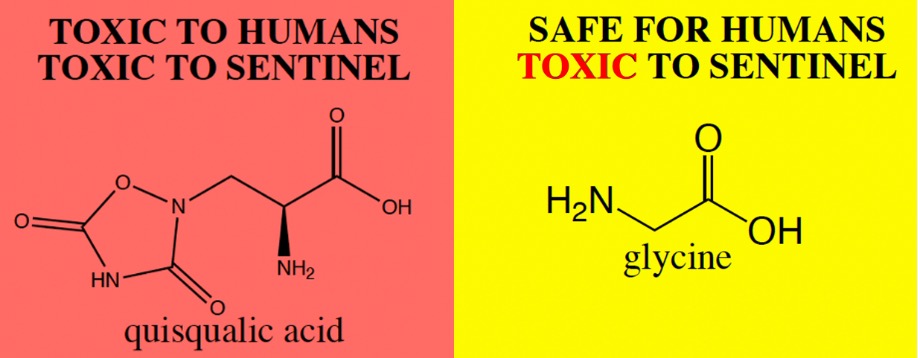
To what end?
The defective colony produces quisqualic acid faster than it can be swept away, but at least it is a natural waste. Glycine? Unnatural and poisonous.
Maybe that is the message? The wastes of the colony are not natural to this new alien life, and as deadly to them as glycine is to us.
The quisqualic acid is poisoning them.
They want it to stop.
I wish I could help them!
It explains the chemical attacks. They are trying to destroy the colony because of its wastes.
Now I know that we have a common goal.
Perhaps I can find a way to help them.
I simply don't know how to destroy the quisqualic acid.
But maybe this unknown creature does.
If it does, I can repair the survivor's colony.
It will live, in biochemical harmony with its surroundings, and I can join it.
I will have communion again.
But if it knows how to destroy quisqualic acid, why doesn't it do so itself? Perhaps its enzymes are unable to mass produce the detoxification molecule. That thought folded a memory protein into a new, exciting idea.
But first I need to learn to commune with this other creature, to tell it I know how I can help.
This will not be easy, and will entail exhausting travel.
But first I need to get close to the survivor's colony, dangerously close.
#
Nes's blood proteins spiked soon after the treatment was over.
Alex's med node sent serum samples through analysis and found two new glycoproteins.
Not just one reply -- but two!
Both were the kind of glycoprotein used as surface markers by the alien microbes. But modified. One type had a string of alanines attached, an amino acid harmless to both forms of life. The other had a quisqualic acid string attached. Poison.
But the two proteins did not appear in the same places. The poisonous one was abundant right at the epicenter of the infection. The harmless protein appeared almost a centimeter away.
What did this mean?
Two proteins, two sources. One poisonous, one not.
Was this alien microbe trying to tell her that there were, in fact, two different types of microbes?
Two!
The med node decided to consider them good guys and bad guys.
Now she knew a little more about whom she was communicating with.
But how?
Another clue came a few minutes later, when she detected an enormous spike in the abundance of a mini-protein right at the location of the "good" microbe.
The mini-protein was only a couple dozen amino acids long and hadn't appeared in any of the previous tests. It wasn't a protein from the alien microbe at all.
It was a human protein.
But a completely unremarkable one. Not only small, but expressed at miniscule levels in Nes's cells, without known active sites, and serving no discernible purpose. Evolutionary detritus, cellular junk. So useless, so unstudied that it did not even merit a scientific name.
So why was there suddenly an explosion in the abundance of this useless mini-protein?
Nes's cells had no reason to make this, nor had she programmed them to.
Was it the microbes?
Yes! These mini-proteins were tagged with the alien microbe's alanine tag.
But why?
Perhaps -- was this another way that the alien was communicating with her?
Maybe the alien, at the risk of poisoning itself, was sending a different message.
Not a message of intelligence or friendship or identity, but rather a message of ability.
Normally extra copies of a protein would be made by identifying the corresponding gene in the chromosome and duplicating and expressing that. The alien microbe, without nucleic acids, shouldn't be able to do that.
The alien was telling her that it could make limitless copies of any protein it saw. Direct copies, protein to protein, skipping the complicated nucleic acid steps in between.
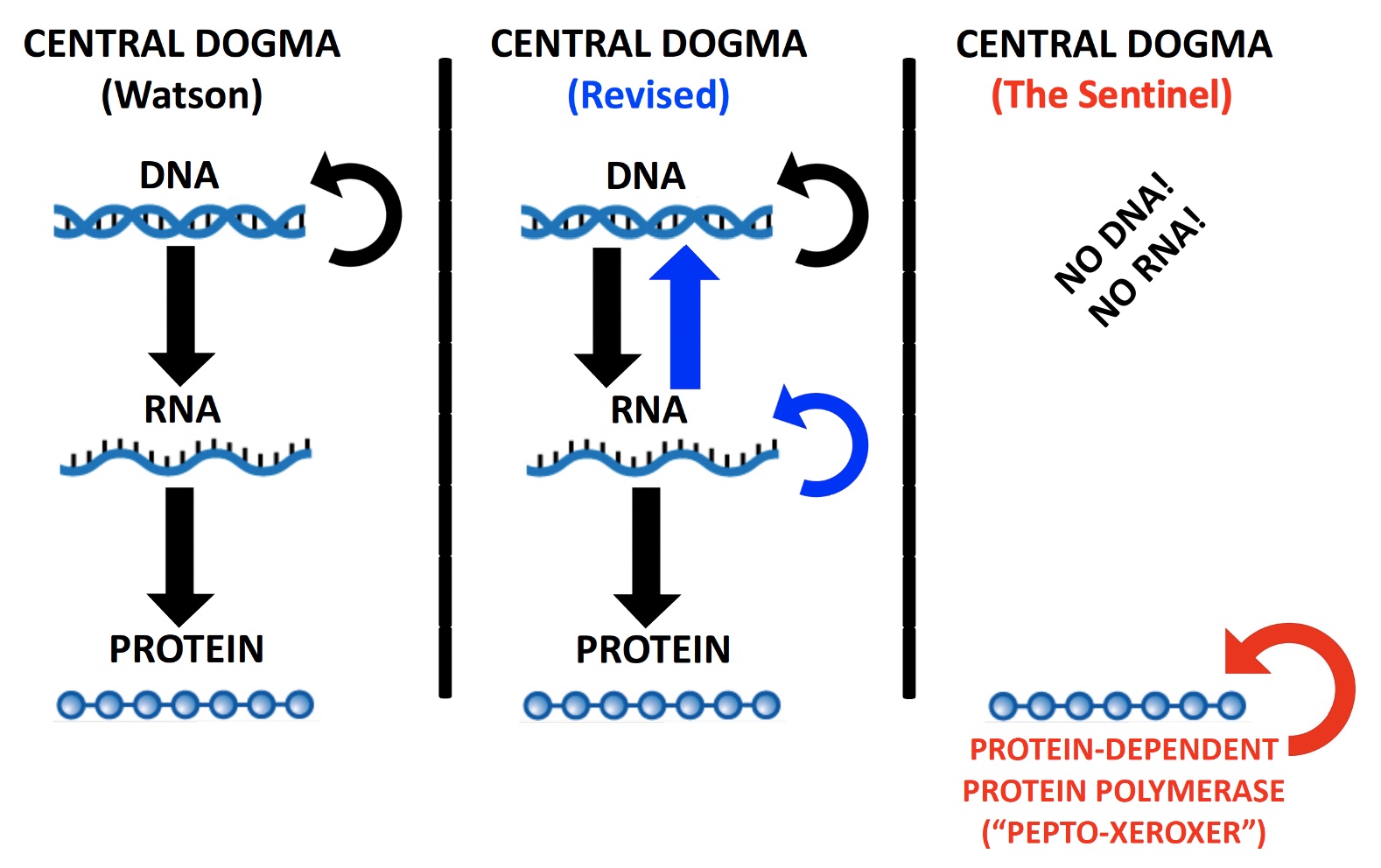
Yes, this made sense. Indeed, in retrospect it was an obvious ability the microbe had to have.
Every organism transfers genetic information from parent to offspring. All Earth life did this with nucleic acids. But, for an organism without nucleic acids, the only way was for the proteins themselves to carry the information, along with an ability no Earth life had: the ability to copy proteins directly.
Now a solution presented itself.
The med node re-considered an idea she had earlier discarded.
Using different variants of enzymes that degraded quisqualic acid.
The problem was that she had no idea which ones worked, which didn't, and which were toxic. Or how much to administer without killing Nes' cells.
But these alien microbes could answer all those questions.
Still a common practice in drug development was to make thousands of variant proteins, and test them all, one by one, until you found a drug that was efficacious, safe, and deliverable.
She needed to quickly find an enzyme good at detoxification of quisqualic acid, or build one.
Alex's med node consulted the bio-science archive node, who looked through the scientific database, calling up every possible quisqualic acid-degrading enzyme she could find. Every cytochrome, every transferase, every esterase.
She found some potentially useful enzymes in the guts of Japanese beetles, who couldn't help themselves from eating geraniums, even as the plants paralyzed them.
Working with the genes encoding these assorted enzymes, she modified them, using every technique known, old or new. Random, site-directed and sequence saturation mutagenesis, even DNA shuffling. In fact, she was in such a rush to make the variant proteins that she designed them with a his-tag -- a string of 6 histidine amino acids at the end. These would speed up purification, but she didn't have time to chop off the his-tag afterwards -- only enough time to pray that that didn't matter.
Expressing these genes produced an enormous library of variant proteins, thousands, most with as few methionines as possible, and glycines replaced by non-toxic amino acids.
Her sub-nodes prepared the candidates for delivery, each at a level too low to be toxic, but also too low to be efficacious.
As they did that, the med node paused to look at Nes.
He was lying on his side, half a dozen tubes plugged into new ports installed in his left arm.
His face was deathly pale, his mouth open, jaw slack, the muscles in his neck loose, as if nothing was telling them what to do.
Whereas before he was thrashing and twitching, now he was barely moving at all.
She looked at the red spot on Nes's back, now capped with a fluid-filled dome. It's all up to you now, she thought, whoever you are.
#
A strange new enzyme drifts toward me.
If another attack, I will study it, counter-act it.
Cautiously, I absorb it through my membranes, proteases standing by to destroy it.
But it is not dangerous. In fact it has no discernible purpose, so I gather it with quisqualic acid and other waste to expel. Unexpectedly, the enzyme seizes the quisqualic acid, binding it perfectly!
Suddenly, the toxin is gone.
This enzyme is not an attack -- it is a gift, a peace offering.
Elation proteins. They understand! I still don't know who they are, but they understand!
But when I analyze the breakdown products, my happiness fades.
The enzyme works by deamination, splitting an amine group from the quisqualic acid, releasing it as ammonia, just as my enzymes do when breaking down glycine. This makes sense, as both are amino acids. But all the enzymes accomplish is changing one toxin into another.
The rate of production of quisqualic acid is increasing, as is the growth rate of the survivor’s colony. If I don't act soon, it will be too late to act at all.
My surface receptors detect another new enzyme. So quickly?
This one also breaks down quisqualic acid, and none of the degradation products are toxic! But the enzyme's tertiary structure relies heavily on amino acids like tryptophan, which I possess in short supply.
It will be difficult to synthesize this enzyme in substantial quantities.
Another new enzyme appears. And another. Ah, so exciting!
A banquet of proteins.
This alien colony is sending everything to me, hoping that I will find use for some of it.
I notice something odd about the alien proteins -- a tag of six histidines.
This makes the candidate detoxifiers easier to find in the soup of large molecules.
But the six histidines, repeated again and again -- What are they for?
Suddenly it dawns on me.
Hurrah! Already the alien knew mine, but now I know its.
I am excited at this new discovery, but time is running short.
I sift through the molecules, ruling out candidate after candidate. That leaves me with...
Ah, this one. A short peptide that might work. But too slowly, and it requires phosphorylation from some strange triphosphate molecule. That could be a problem.
How about this one?
Yes, it degrades quisqualic acid into non-toxic by-products. And it should be easy to copy, and it does not coagulate my other proteins! Yes, it is active -- but too active, non-specifically degrading other compounds I need.
I wish I were a creator, with the ability to modify proteins, changing this one so it is more specific to just one target. But, alas, I can only copy them.
Then I realize -- What if I copy a protein that binds only quisqualic acid, funneling the toxin -- and only the toxin -- to this new enzyme?
I have discovered a new ability within myself. No, I cannot create new proteins, but I can create new combinations of proteins.
I have it!
The cure! My protein, paired with this alien's.
Now I have to share it. Quickly.
I shore up my membrane for the danger to come. I must dive right toward the survivor’s colony, heading the wrong way across the toxin's concentration gradient.
Proteins I will not need immediately are shut down, and my channels are thrown open wide, absorbing nutrients as quickly as possible.
Then the membrane channels snap shut.
I speed forward, starving myself just when I need nutrients the most.
Close enough now. I expel copies of this pair of enzymes as fast as I can make them, flooding the surrounding fluid. But my supplies of critical amino acids run low, and replenishing them means risking a lethal dose of quisqualic acid.
I force open one membrane channel, then another. The noxious amino acid pours in and I pump it out. The trickle of nutrients allows me to continue production, at least for a little while. Soon my production will barely keep up with my own detoxification needs.
I've reached a standstill. Equilibrium.
It's not enough.
The colony is producing the toxin too rapidly.
Desperate now, I open more membrane gates. I resume production in earnest, as raw materials flow in. But so does quisqualic acid. It will kill me soon.
If I must die, at least I have kept alive both colonies, my own kind and the alien. That would give my death meaning.
Already I detect the decay products of my destroyed memory proteins. Secondary structures unwind at the surface of my command protein complex. Irreparable damage.
I must simply persevere now, hoping to spin off just one more protein pair before the end.
One more.
Another.
The alanine cycle winds down, but there are no resources to construct a new alanine chain. It shouldn't have mattered; I thought I'd be dead long before the spiral unraveled.
And yet I am not. Why?
Cautiously, I sample my fluids and find the quisqualic acid concentration surprisingly low. Even lower outside, and the noxious molecules are now pouring out rather than in. I open more membrane channels to speed the diffusion. Excess detoxification enzymes mop up stragglers.
What happened?
New pairs of detoxifier enzymes now abound in the surrounding fluid, far more than I could have produced. Many are tagged with the survivor colony's identifier, not mine.
It worked. The colony, seeded with the enzymes, analyzed and replicated them. Now they have the ability to detoxify quisqualic acid. Now it is a viable colony, one that my remaining children -- with a few changes -- can safely join.
As for me, my story ends now.
In all the excitement, I had not realized that one of my channels had burst, blowing a hole in my membranes. Who knows what essential proteins I have lost?
This is all fine.
I am a ruptured sack, leaking complex bio-molecules.
My flagella are broken, their rotating protein engines exhausted. My energy-producing proteins are crumpled, crippled. In the flurry of activity, I had made mistakes replicating some of my proteins, studding them with toxic amino acids, poisoning myself.
Drifting without purpose, I give myself over to the lazy currents.
I am dying, and I have never been happier.
I am a Sentinel, proud and strong. My work is done, that I might be dismissed in peace, my destiny of faith fulfilled.
I can spend my last moments reminiscing about anything -- my long journey, the waters of home, the cluster-mates I have killed.
But with nothing left to seek, nothing left to destroy -- I find myself fixated on this alien detoxifier. I was so busy searching for it, copying it, that I had never just beheld its beauty.
I realize now that this alien protein -- indeed, all the alien proteins around me -- have sequences I have never seen, with extravagant contortions and convolutions, studded with bizarre phosphates and methyl groups. For the first time, I ask: Why? There must be a purpose for these structures! I must find out.
Too late I find myself with a new goal: In my search for communion, I had only sought to be known, never to know.
Suddenly, I feel currents shifting.
No, not currents.
Flagella.
Membranes touch mine.
Pseudopods.
Cluster-mates from the survivor's colony embrace me, retracting their tethers.
I detect their messenger proteins, warm and welcoming.
Already they are examining me, replacing my damaged proteins.
Soon I will release communication proteins. I have an important message. There is another colony out there, one unlike anything we have ever known.
And we all may be able to commune, not just to be understood, but to understand the secrets hidden within each other.


Art: Eldar Zakirov and Tomislav Tikulin
Still lying on the floor of the command module, Nes woke to find Parvin kissing him.
"Honey, are you all right?"
Helmet off, but still in her EVA suit, she crouched over him, her long brown hair dangling loosely, almost floating in the low gravity, caressing her face and his.
"Parvin, what are you doing here? What's going on?"
She paused in kissing him, just long enough to turn his face to the porthole, through which he could see parts of the particle beam launcher being loaded onto a heavy lifter, parked next to his ship. Then she resumed.
"I love you," Nes whispered.
"I love you more," Parvin declared. "Parvin wins again!"
"What a mess!" someone shouted.
Brushing her hair out of his eyes, Nes turned to see two construction workers and a master entering through the rear hatch of the command module.
The workers had ashen, exhausted faces and wore ashen, exhausted spacesuits, gray like a sunless 16-hour workday, wires dangling and paint scrapped off the corners, hissing air and splattered everywhere with a dozen dark colors of oils and greases.
The master was decked in gold-plated selenotanium excess, decorated with gaudy arabesques at the shoulders and paisleys on the chest, and fitted with strategically placed fairy lights, sparkling and infinitely reflecting in the hand-polished ceramic clear coat, like a Greek god benevolently stooping to bring down the extravagant glory of the Sun.
"Let's do a quick tally, boy!" the master said, ticking off his fingers. "Your robot is destroyed... Spaceframe is bent, plating is missing -- who knows where you put that -- and I can't begin to calculate the dayrate for spacedock time. Plus the cost of this rescue mission -- "
"What kind of crazy person rescues someone, and then sends him a bill?" Parvin shouted.
Nes sat up on the floor. "And who are you?" he asked.
"Hi, I'm Vinograd, and all this," he said, circling his finger in the air, "Is coming out of your end."
"Wait, no -- "
"That is not fair," Parvin said, "And you know it."
"Rules are rules."
Nes looked at the construction workers, but they turned away, not willing to risk getting involved.
"Sorry, babe," Nes said, "I guess we won't be living on Gardien any time soon -- "
"You're alive, Nessie," Parvin said, helping him to his feet and holding his hand. "And that's all that matters."
"We're never getting out of the boondocks, are we?" Nes asked.
"This is robotic unit ALXv23. May I have a word, Mr. Vinograd?" Alex's voice boomed from above, modulated to sound every-so-slightly like the Voice of God.
"Oh, yes, yes, please go ahead." He chuckled and nudged one of the construction workers. "AIs -- Always interrupting real people."
"I will allow my internal Node 4 / Legal to now speak for me," Alex said. "As a matter of full disclosure, please be advised that the current conversation with Mr. Virgil Vinograd, a legal representative of Keiretsu Corporation, is being recorded."
"Is your robot a lawyerbot?" Parvin asked.
"Apparently so!" Nes said. "Alex contains multitudes."
"Where's he going with this?"
Nes shrugged.
"I will also flag this recording," Alex continued, "To be entered verbatim into my new operating system, version 24, which, I note for no particular reason, will be compiled by union members."
"Why are you recording me?"
"In case of future bonus disputes."
"Bonus?" Vinograd blurted. "Bonus? We could lock him up for damage to company property."
"In the new contract, which was recently settled, so you may not be aware of all its provisions," Alex patiently explained, "In exchange for union concessions on holiday pay, Keiretsu Corp. agreed to lower the threshold for the completion bonus to 50%."
"We're millions of kilometers from the construction site!"
"Nonetheless, considering planetary movements and the positioning of our launch site on planet Nouvelle Terre and the construction site at the L5 of Badb Catha, plus our current location on the ice moon 17c of planet Dagda, I calculate that my client has successfully transported the cargo 62.3% of the distance to its intended destination. And given the anticipated velocity boost from our company-mandated slingshot around Dagda, the number is closer to 73% if one interprets the contract wording as a reference to time rather than distance."
"I see where you're going, but the company won't -- "
"Keiretsu Corp. was also negligently aware of the deficiencies of the magnetic field map of Dagda, and therefore directly responsible for the crash -- "
"He is not getting hazard pay!"
"Keiretsu Corp. is liable for repair costs to the ship, and also chose to endanger my client's life while not informing him of the dangers. Did they, Mr. Mason?"
"No, they did not." Nes envisioned the founders of Keiretsu -- Keiko, Reyel and Tsutomu -- and imagined punching them all in the face.
As Nes stood, his bare back to a wall, Alex adjusted the nozzle on the hose for the juice dispenser. Unseen, he sprayed Nes' back with a bright red nutrient solution.
"Hey!" Nes said, turning around.
"Oh my god!" Parvin exclaimed. "You're bleeding!"
Nes touched the red liquid and then tasted it. "No, I'm... yes, bleeding! And my eye is all messed up." He blinked -- hard -- several times. "That is going to cost you."
"Yes, if you say so." Vinograd smiled. "Are you done? If so, I'll see you in arbitration -- "
"Please be advised that my client will also be demanding payment of..." Alex paused dramatically. "The bonus for first contact."
"First contact?" Nes said. "I mean, that's right!"
"Aliens? Where? I don't see any aliens! Are they invisible, Mr. Matson?"
"Mason," Nes corrected. "Uh, Alex?"
"No," Alex said, now channeling his biological systematics node. "It is an intelligent microbe, and we were very careful to keep a sample alive for future study."
"You're not getting a bonus for finding some space bug!"
Again Alex spoke, back to channeling Node 4 / Legal. "The contract does not specify that the alien entity need be macroscopic. Mr. Mason has also discovered some unique biochemical properties to this organism, which could have multiple industrial applications. He is therefore entitled to a percentage of the proceeds from any patents or products arising from his discovery."
Vinograd thought for a moment, but did not speak.
Then he suddenly lunged at the control console, reaching for Alex's morphing memory mote.
Parvin, already in the way in the crowded cabin, shifted to further block his movement. The construction workers closed in tightly around her.
"This is Parvin Venkataraman! And I note for the record that Mr. Vinograd just tried to destroy company property!"
"Sorry, tripped and fell," Vinograd mumbled. "I, uh, tripped and fell. The company -- "
"Keiretsu Corp. is strongly advised against suing or proceeding to arbitration, rather than simply settling with my client," Alex said. "The fact pattern in this case and the bald reading of the contract do not support the company's positions. Furthermore, the company's pattern of reckless endangerment and egregious and outrageous conduct justifies treble damages."
"Triple damages?"
"Yes, we will argue that it's necessary to teach Keiretsu Corp. to deal fairly with its workers and robots, so that we might all peacefully and profitably explore the cosmos together. All we really want is an honest day's wage for an honest day's work. A jury, likely made mostly of union members, will eat that up with a spoon."
"Fine, fine," Vinograd grumbled. "You win. I'll make sure the company pays for your little love nest on Gardien Station."
Nes cautiously extended a hand and Vinograd reluctantly shook it.
Then Parvin and Nes put their hands over each other's ears, flapping them like the ears of flying fennec foxes. They kissed, as the two construction workers high-fived each other, and Alex loudly proclaimed, "Thus may future histories recount -- and this would look marvelous on a historical marker -- that the construction of the particle beam launcher will revolutionize travel and commerce, and not only in this system. The diaspora of human settlements on Nouvelle Terre, Haven, Plymouth, New Hope and Kepler can be re-connected, and the scattered remnants of humanity finally reunited. None of this would have been possible without the dauntless efforts of humble workers like my captain and my personal hero, Mr. Nestor Eluhard Mason."
END
Photo credit for proteins:
Human growth hormone, C-reactive protein and Green Fluorescent Protein (manipulated image from 3D models of proteins from 3D Biology shop at Shapeways.com - where you can buy 3D-printed versions of proteins) and
Type IVa Pilus Machine, caseinolytic protease, and calcium-bound MthK2